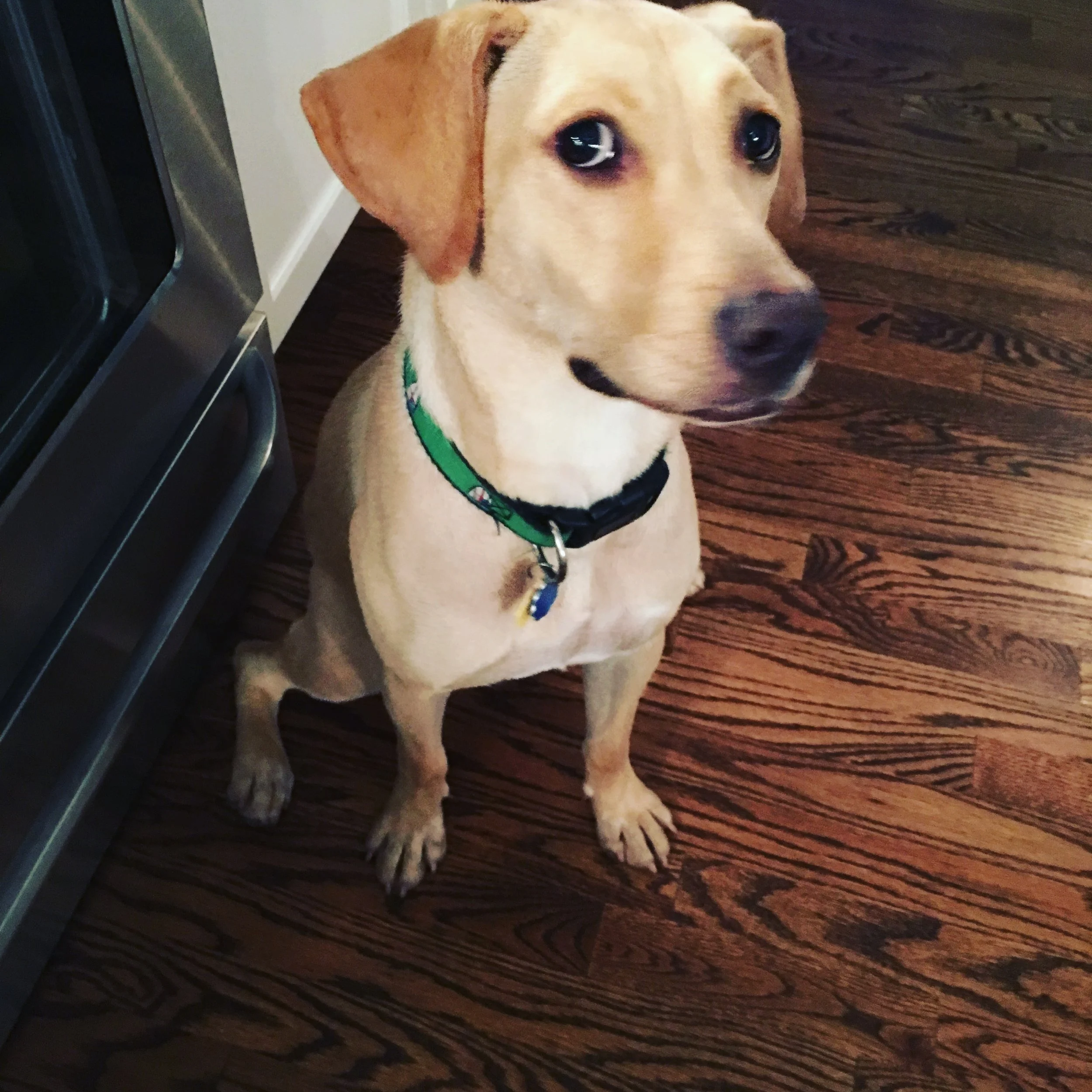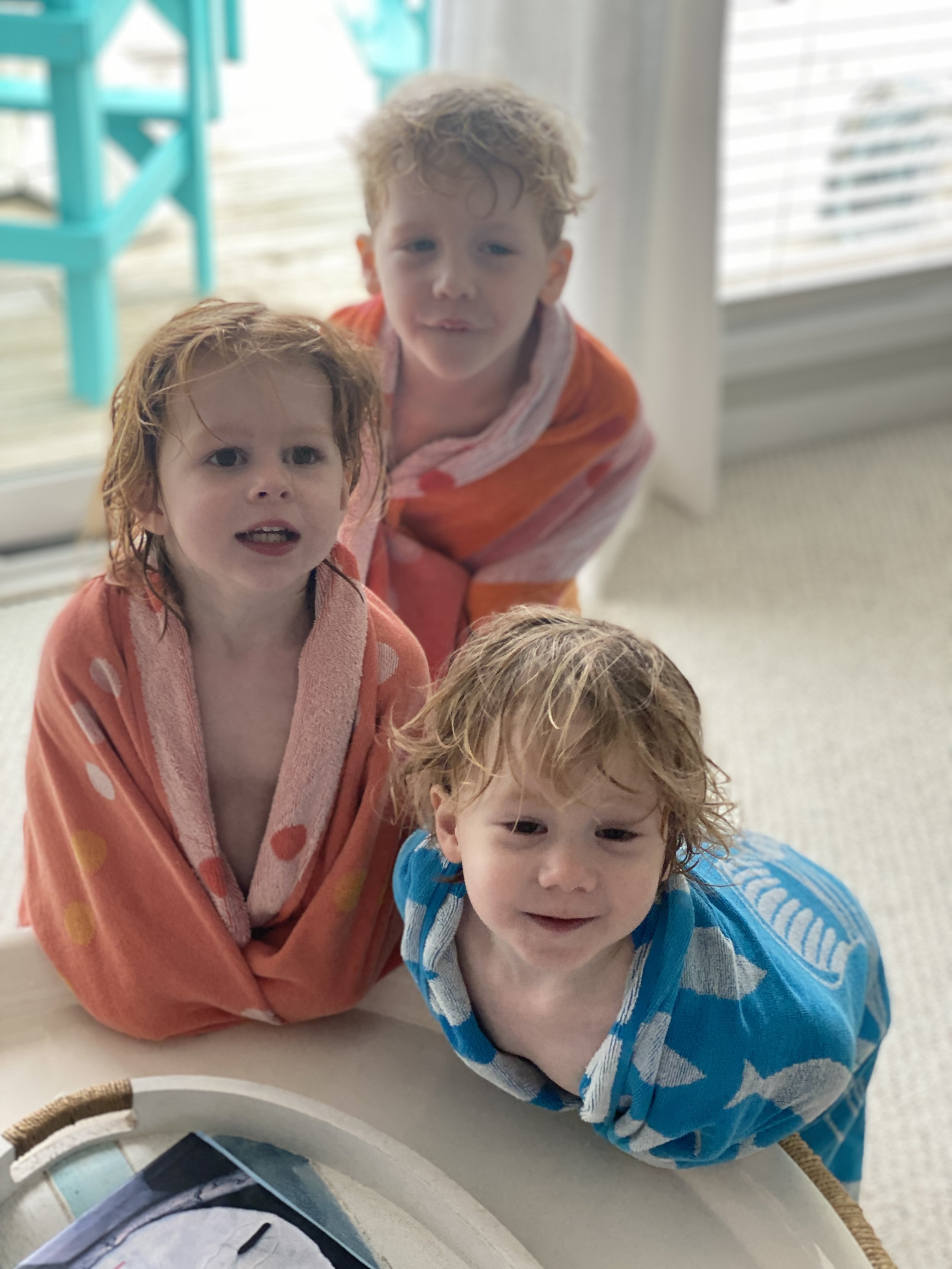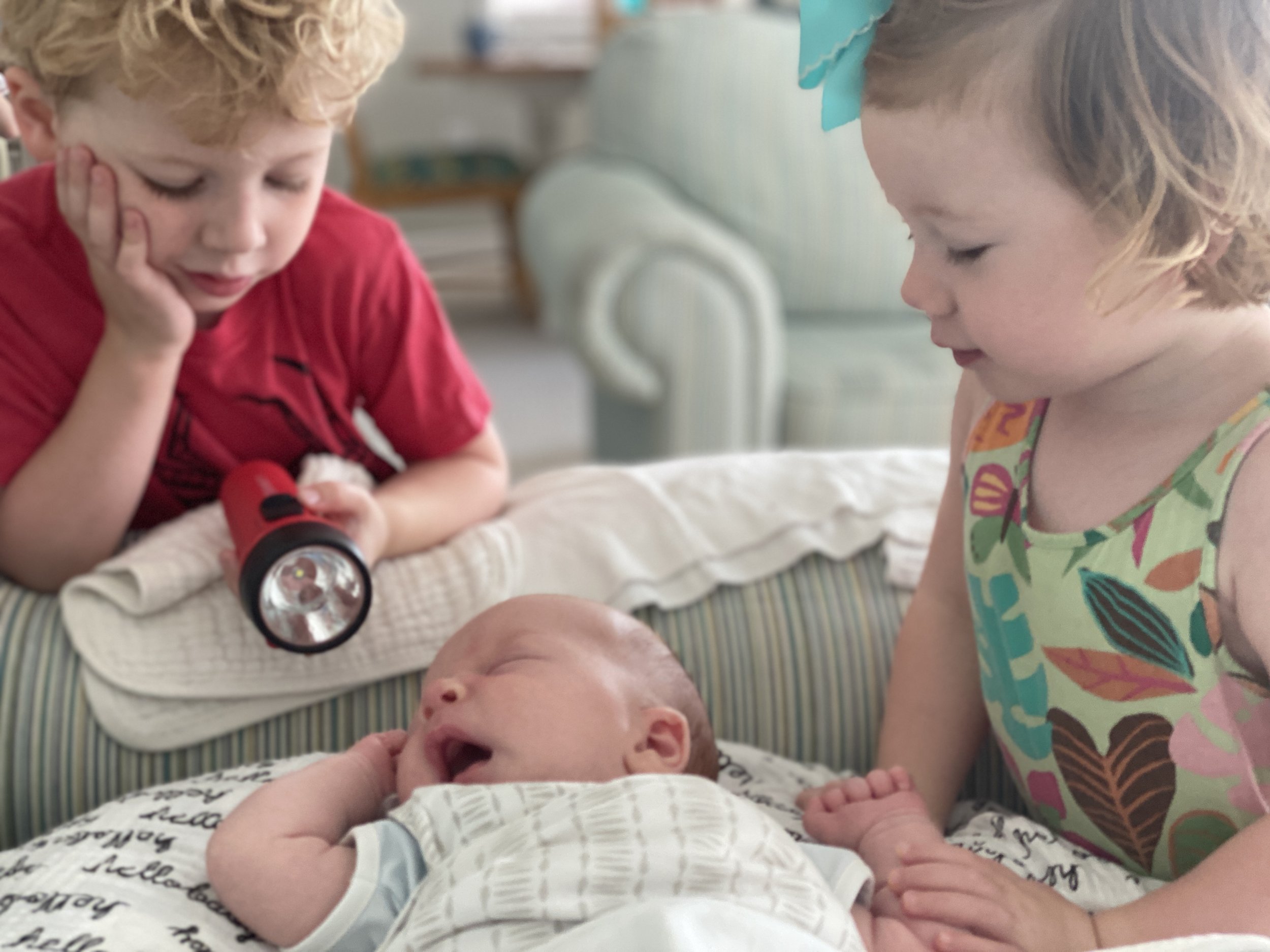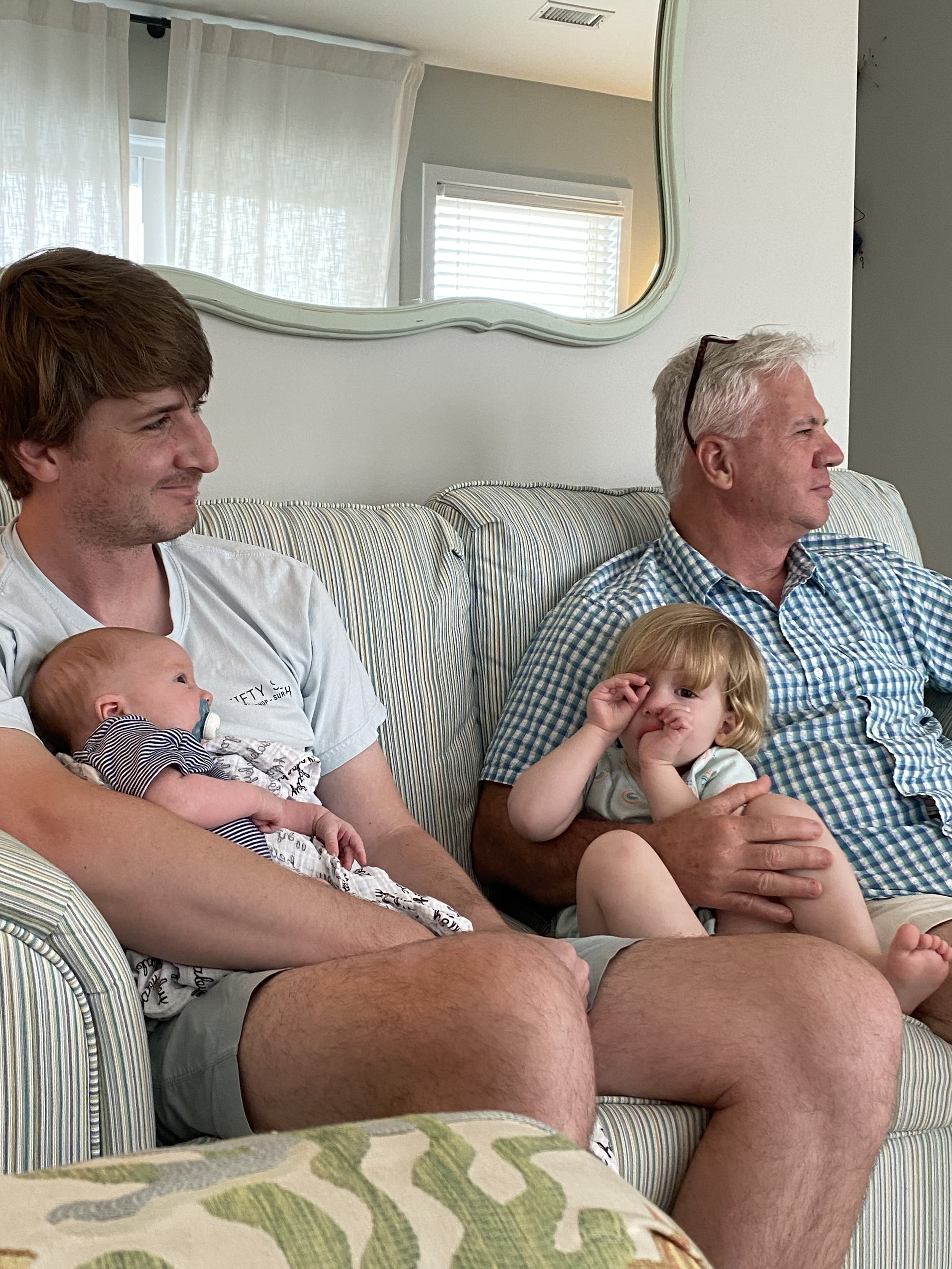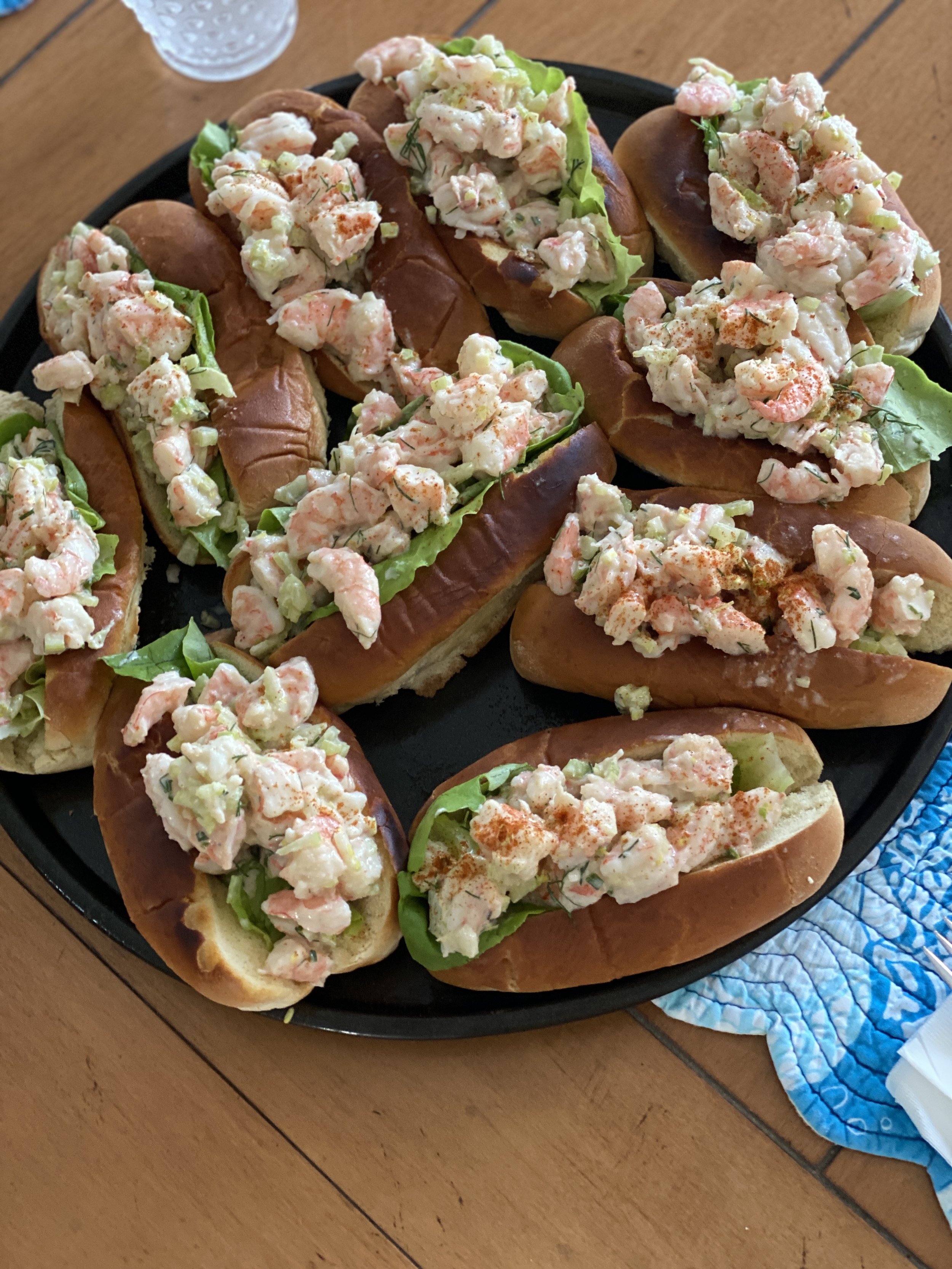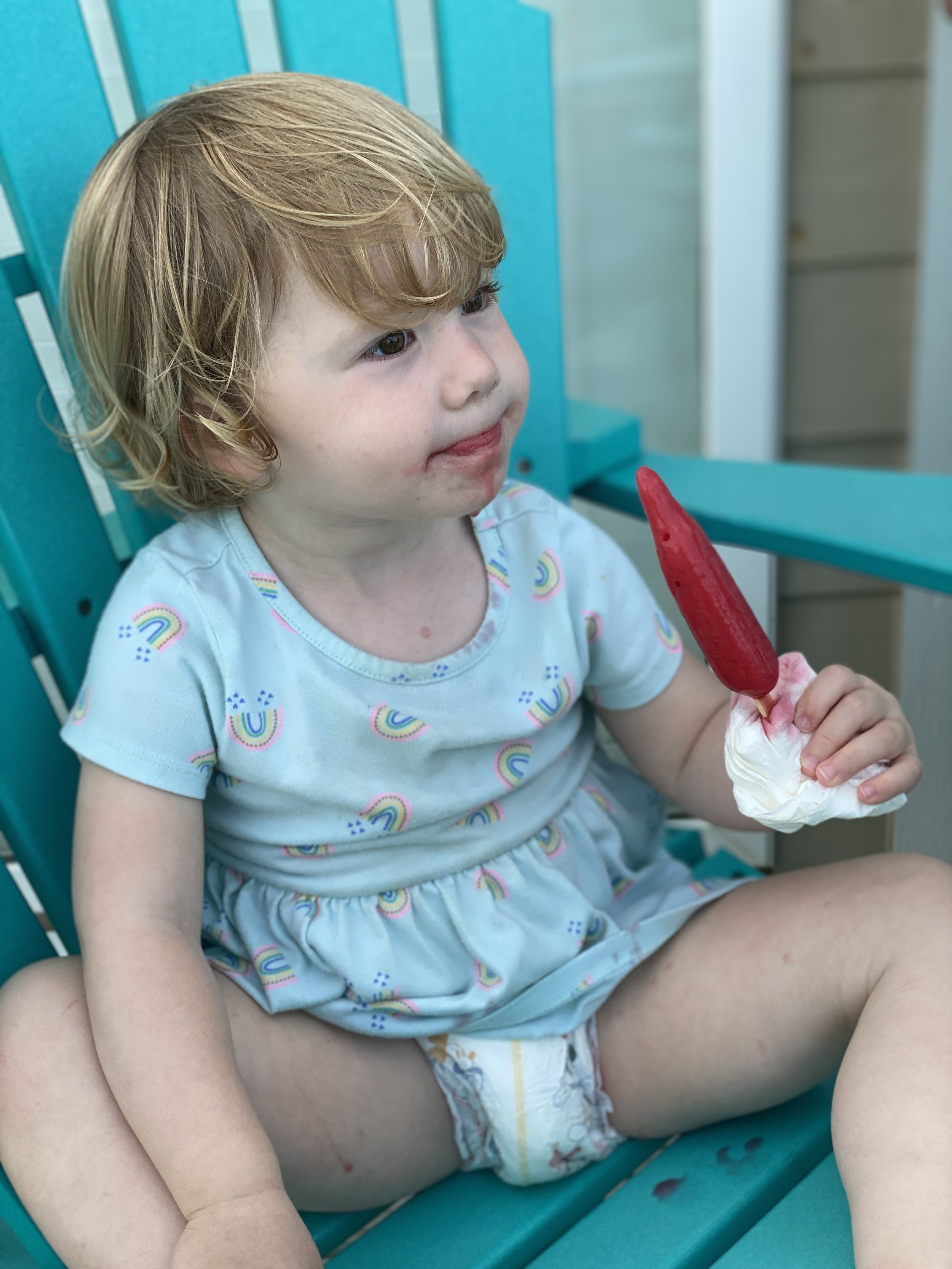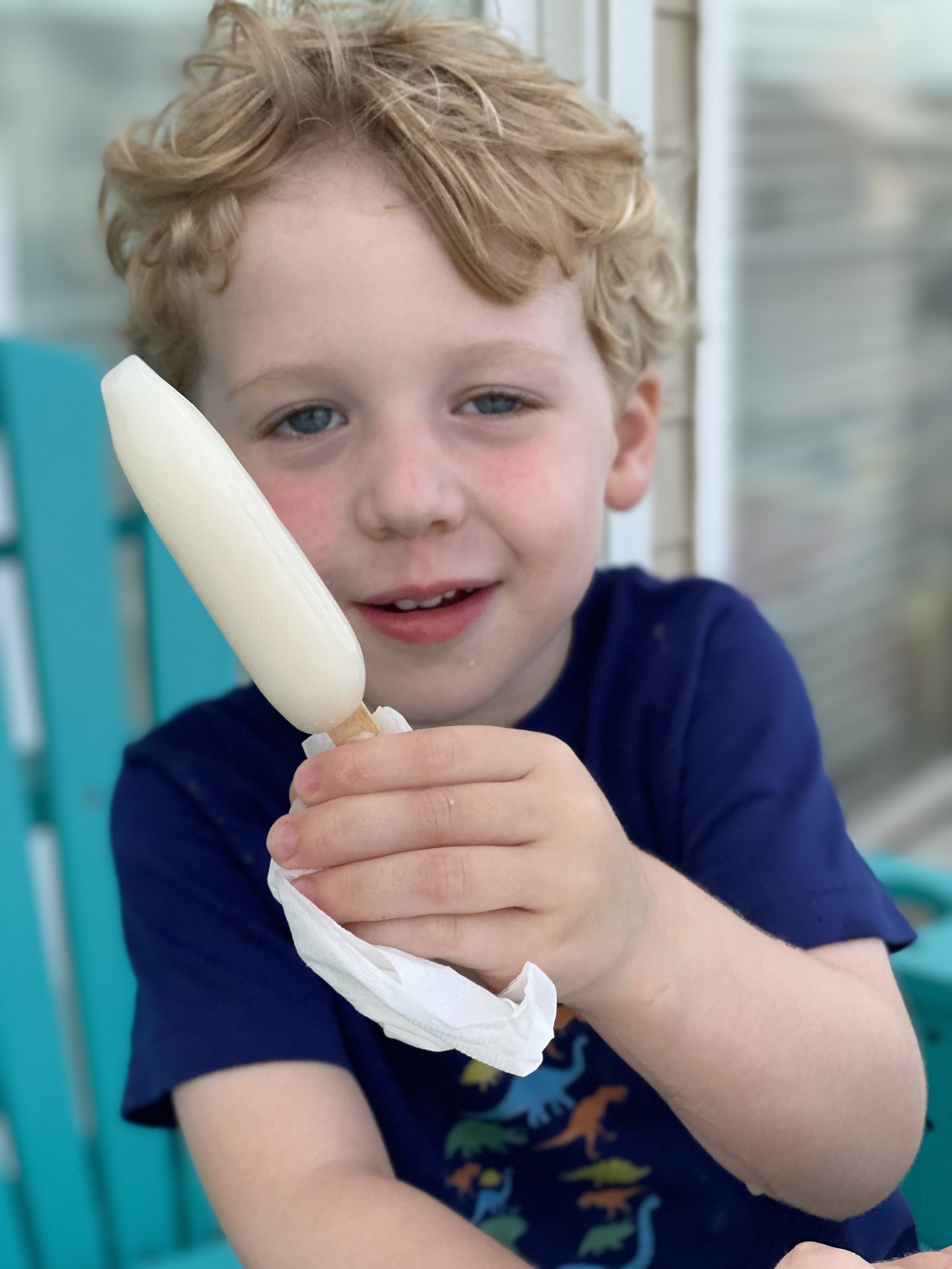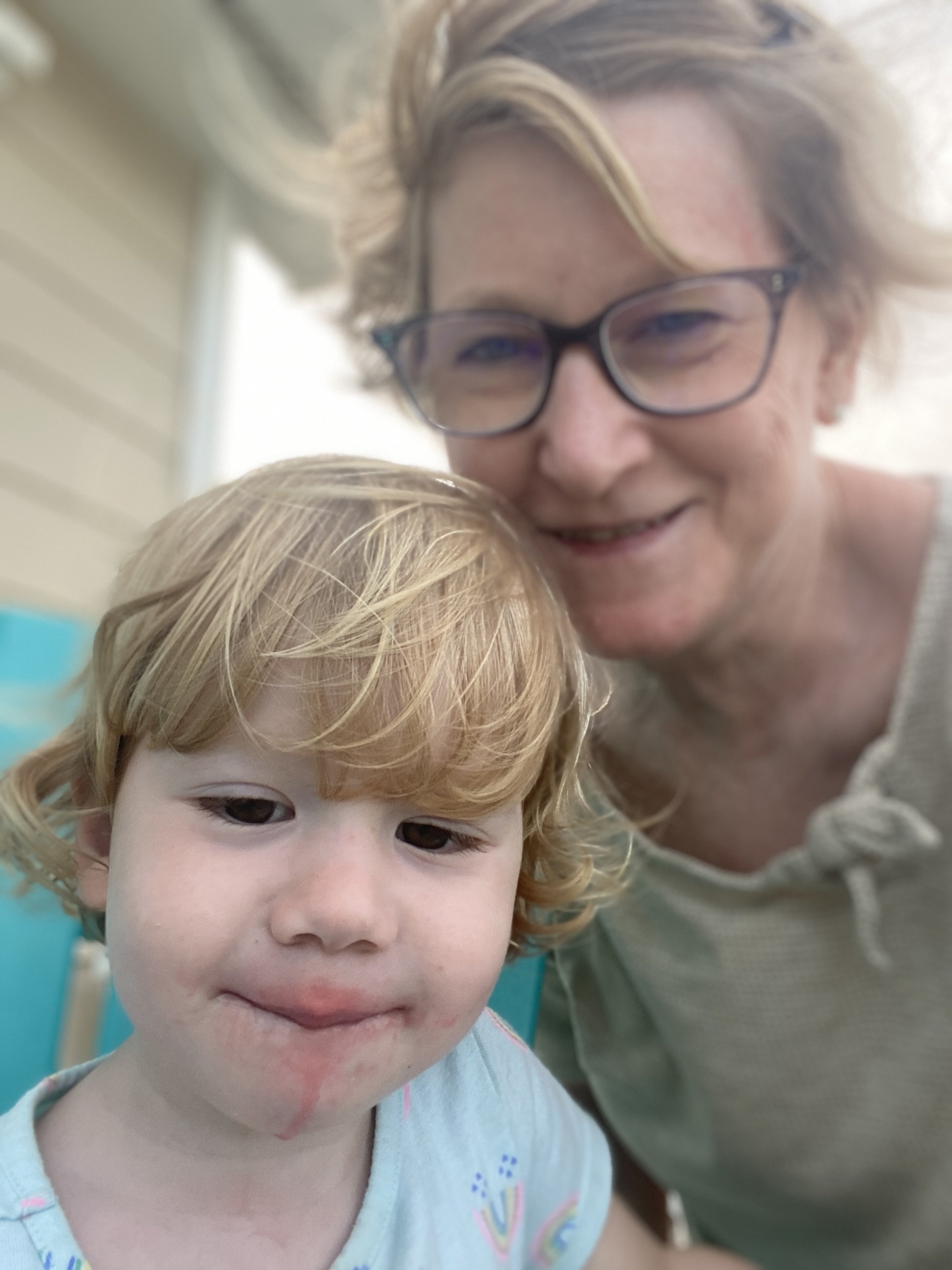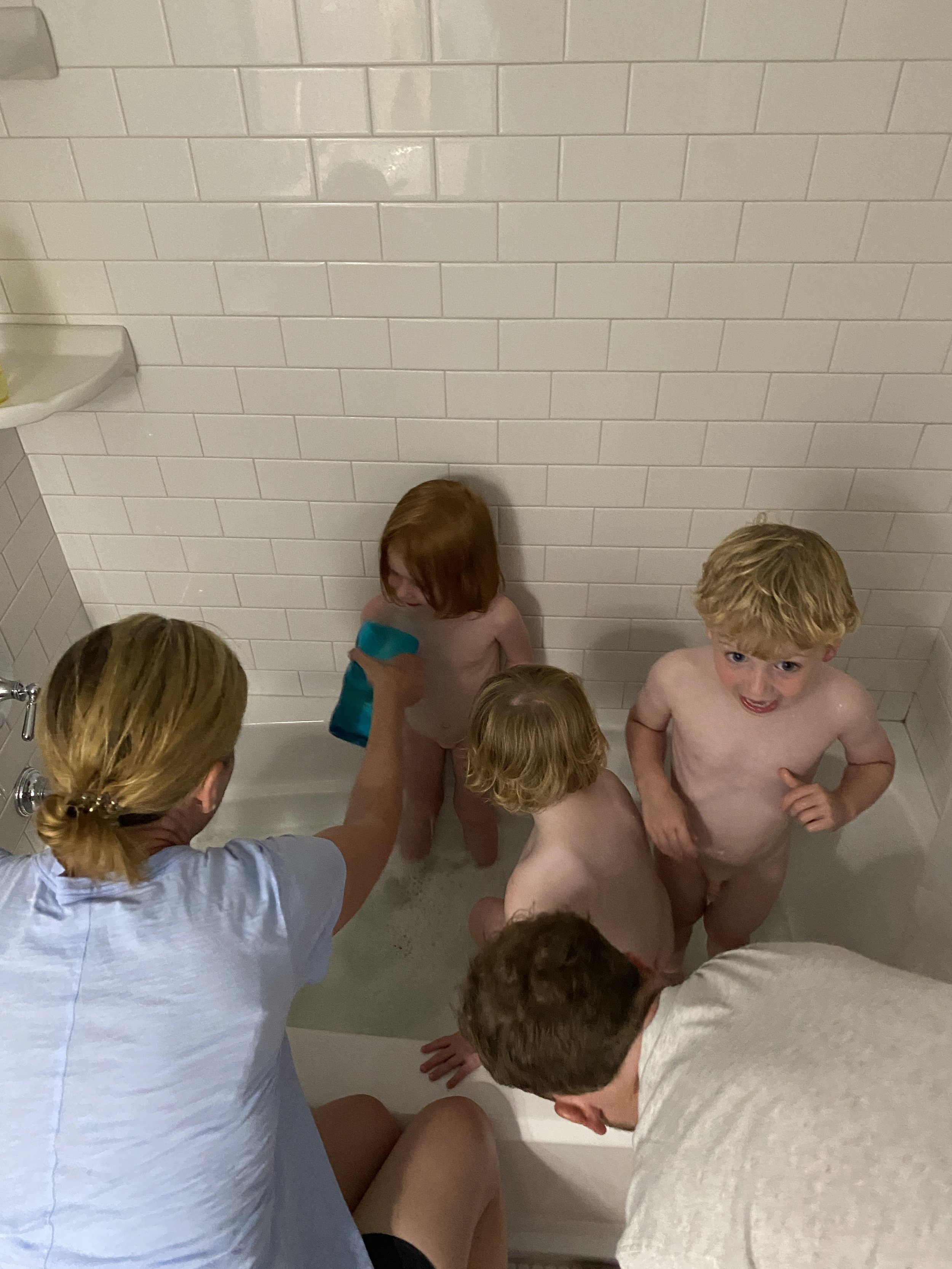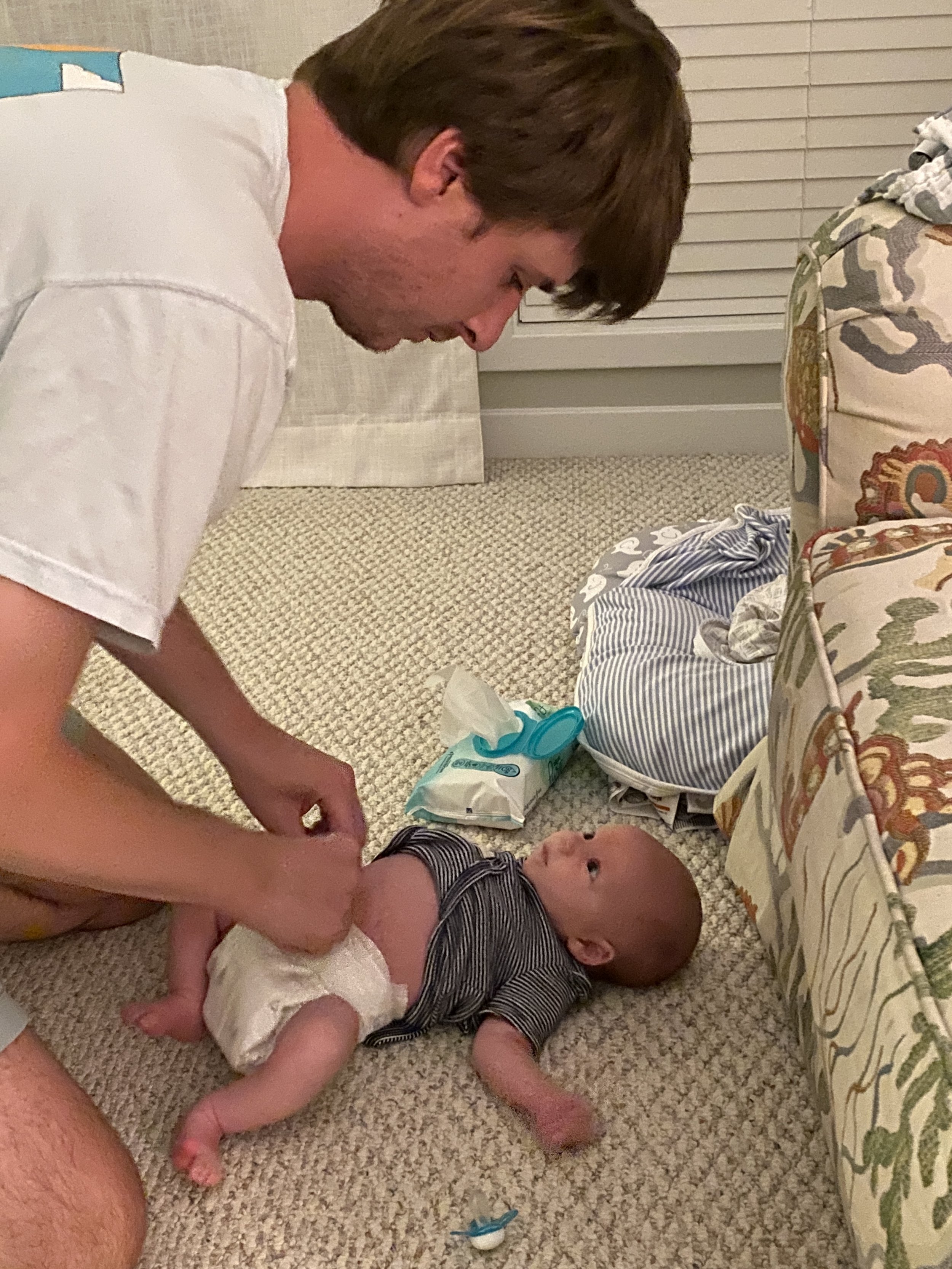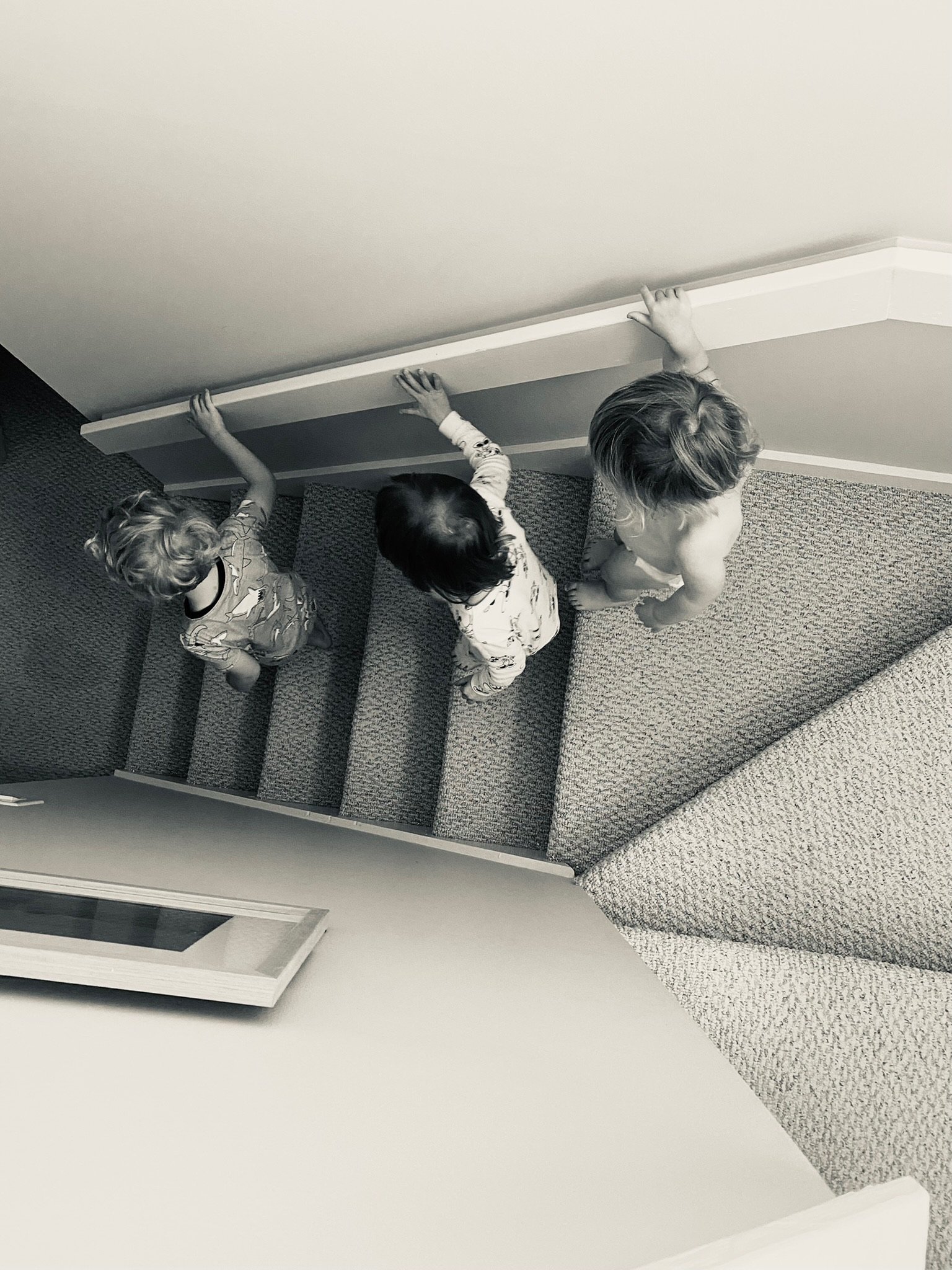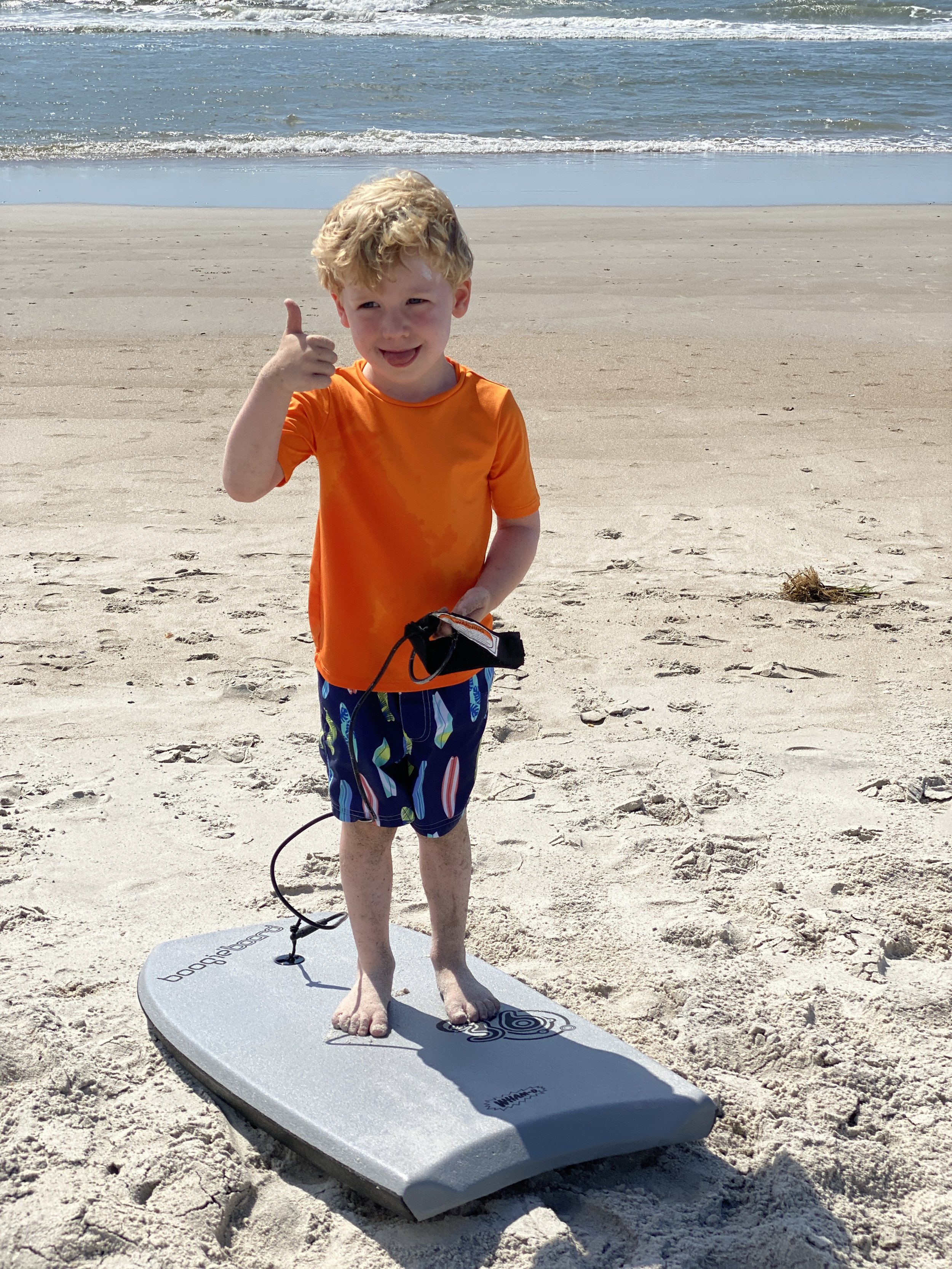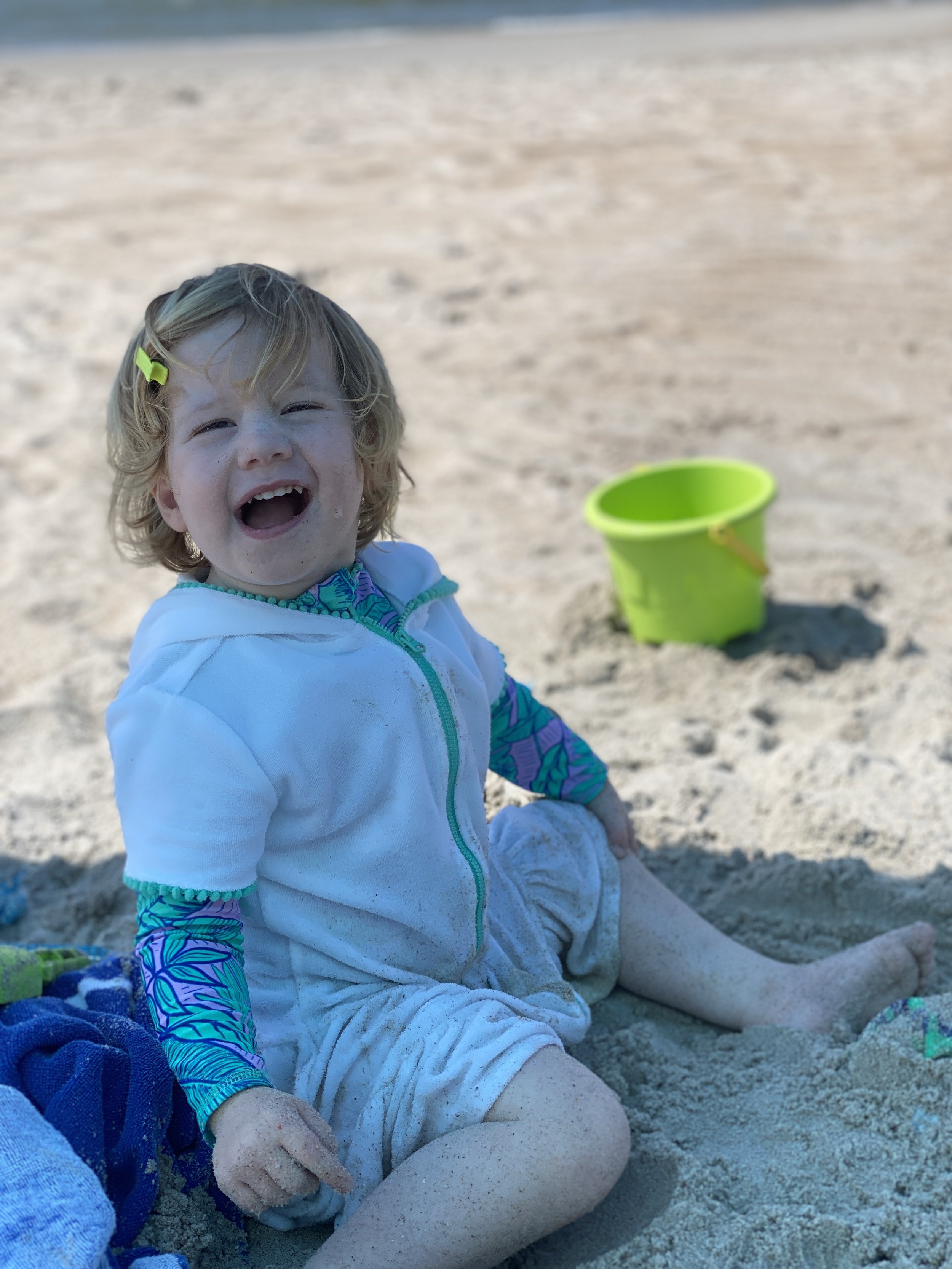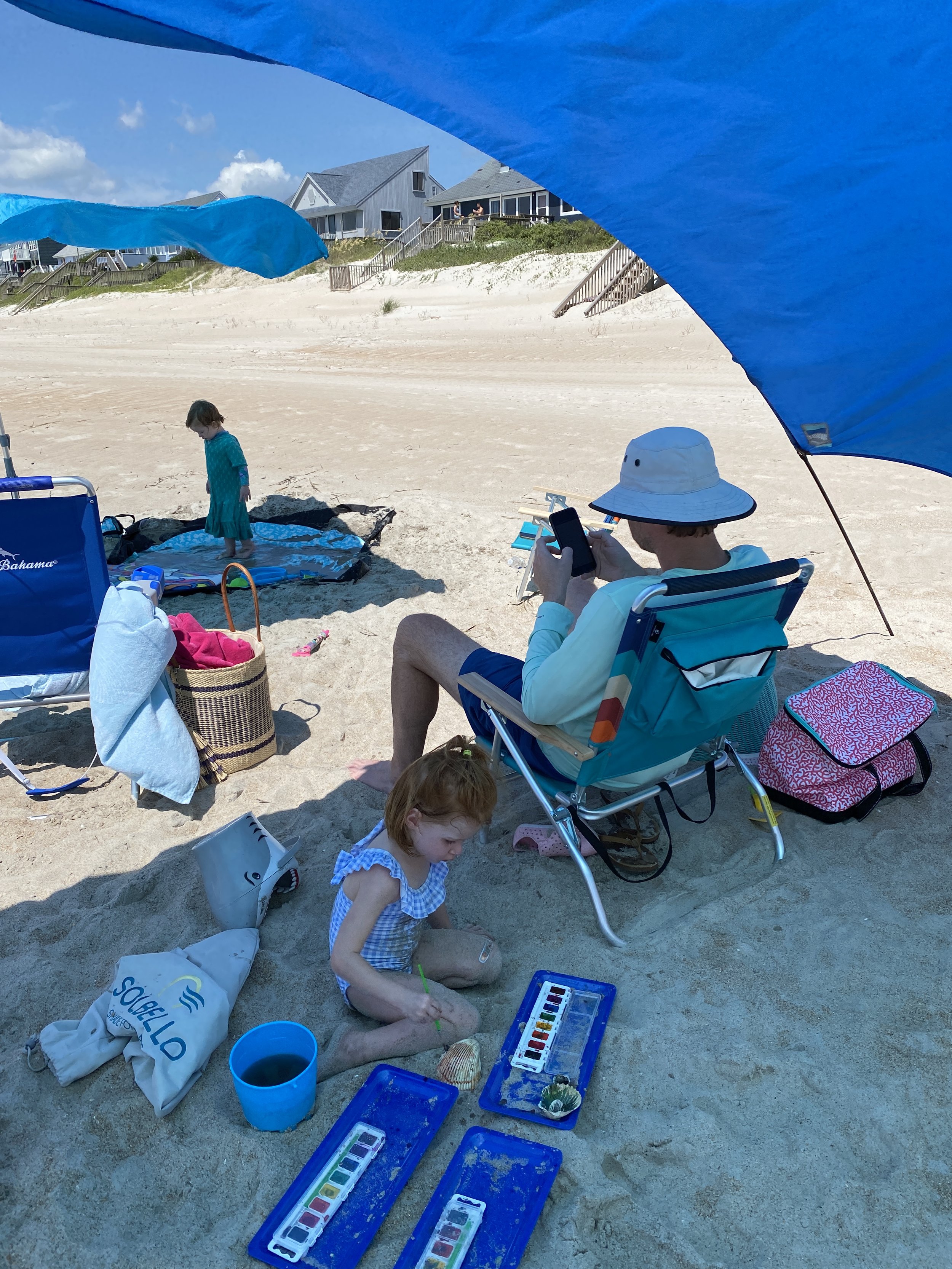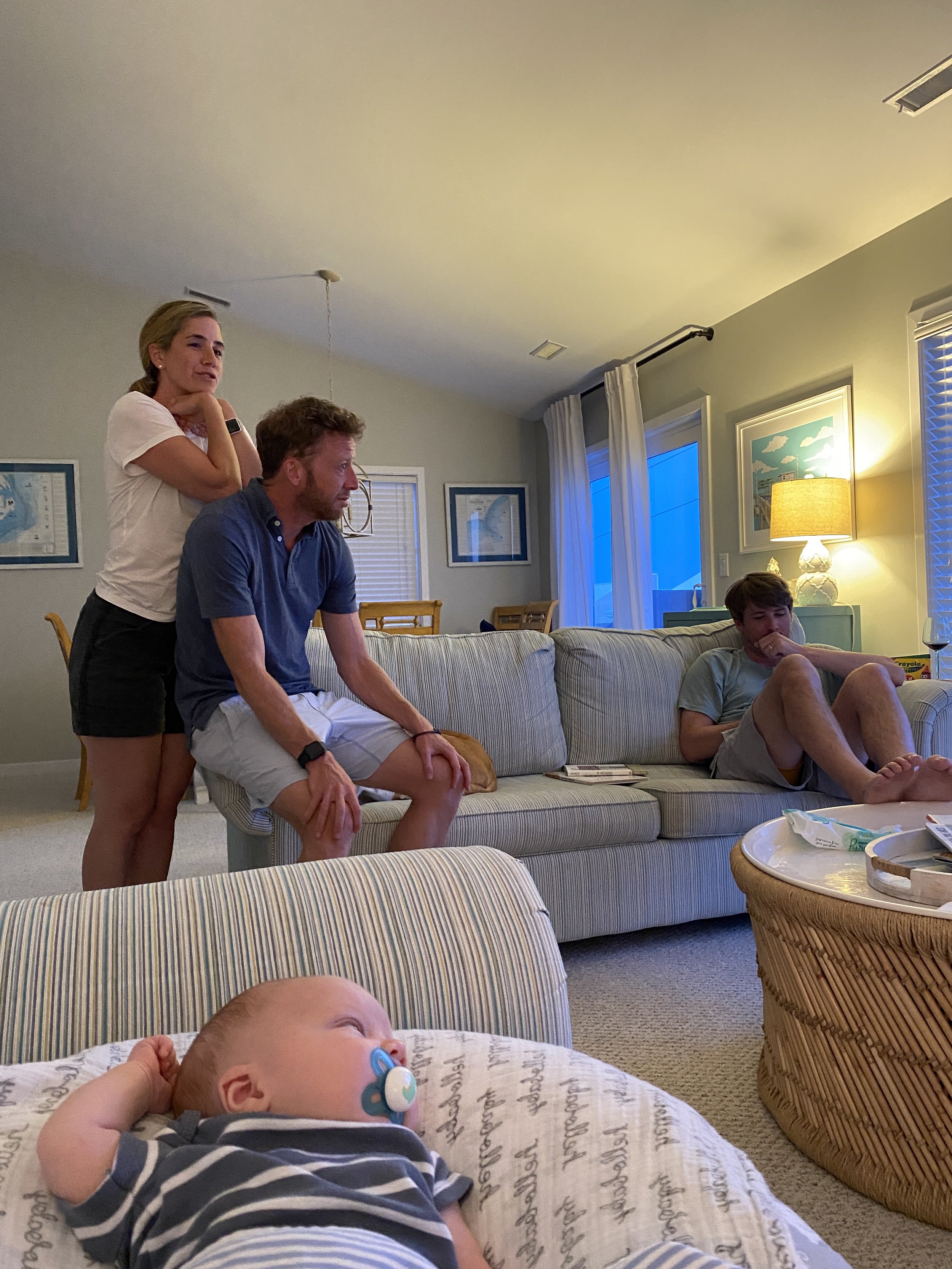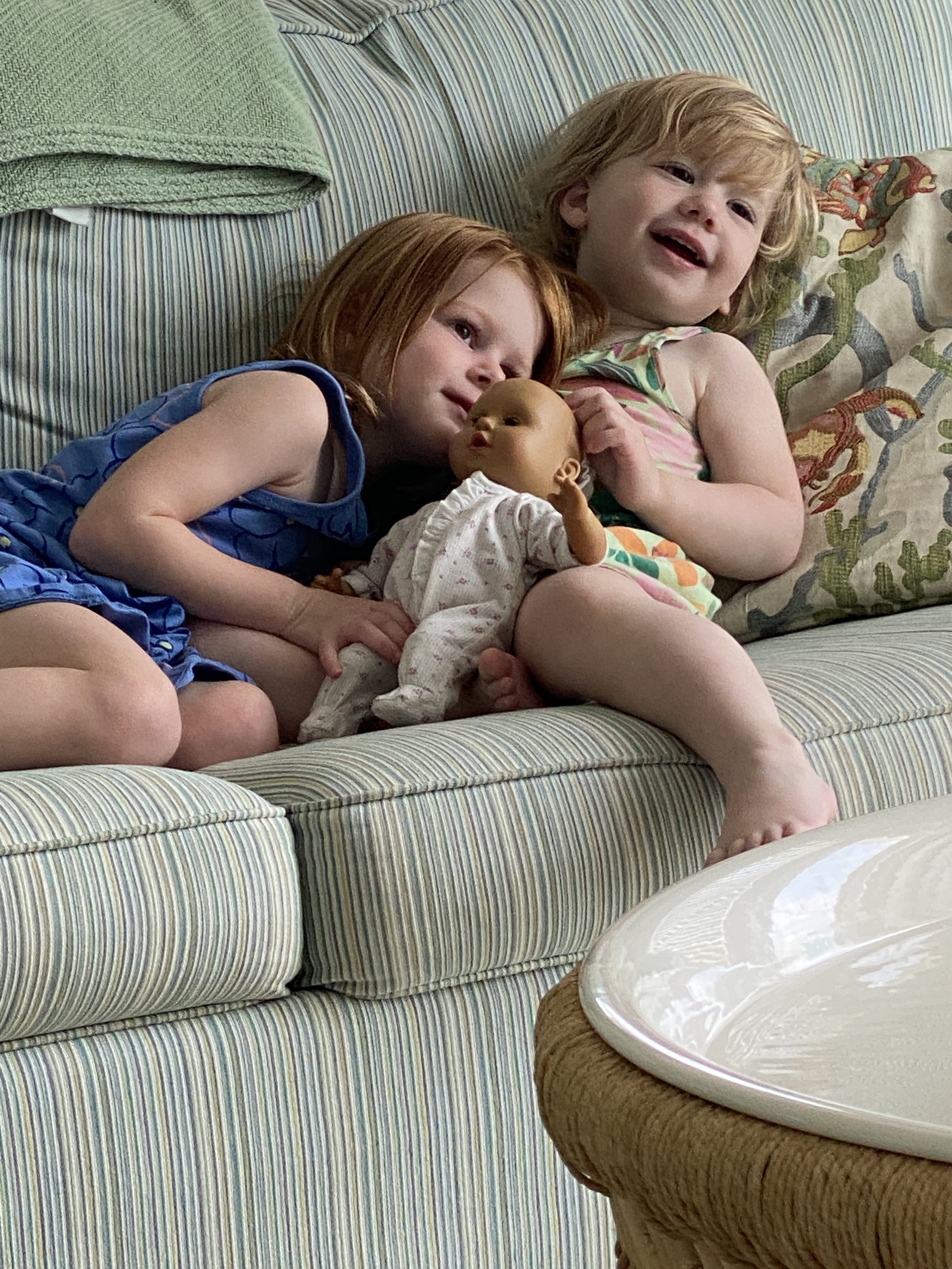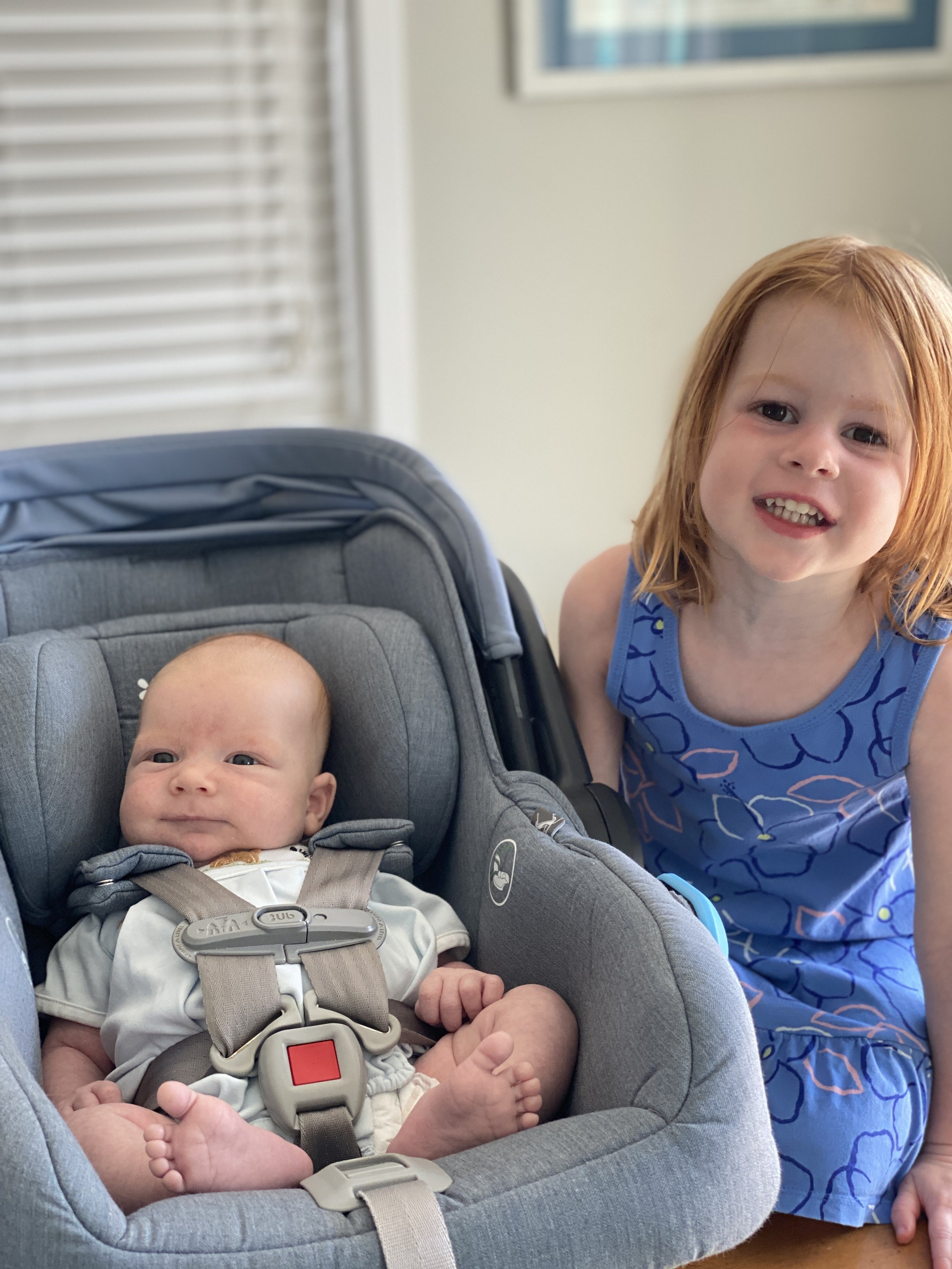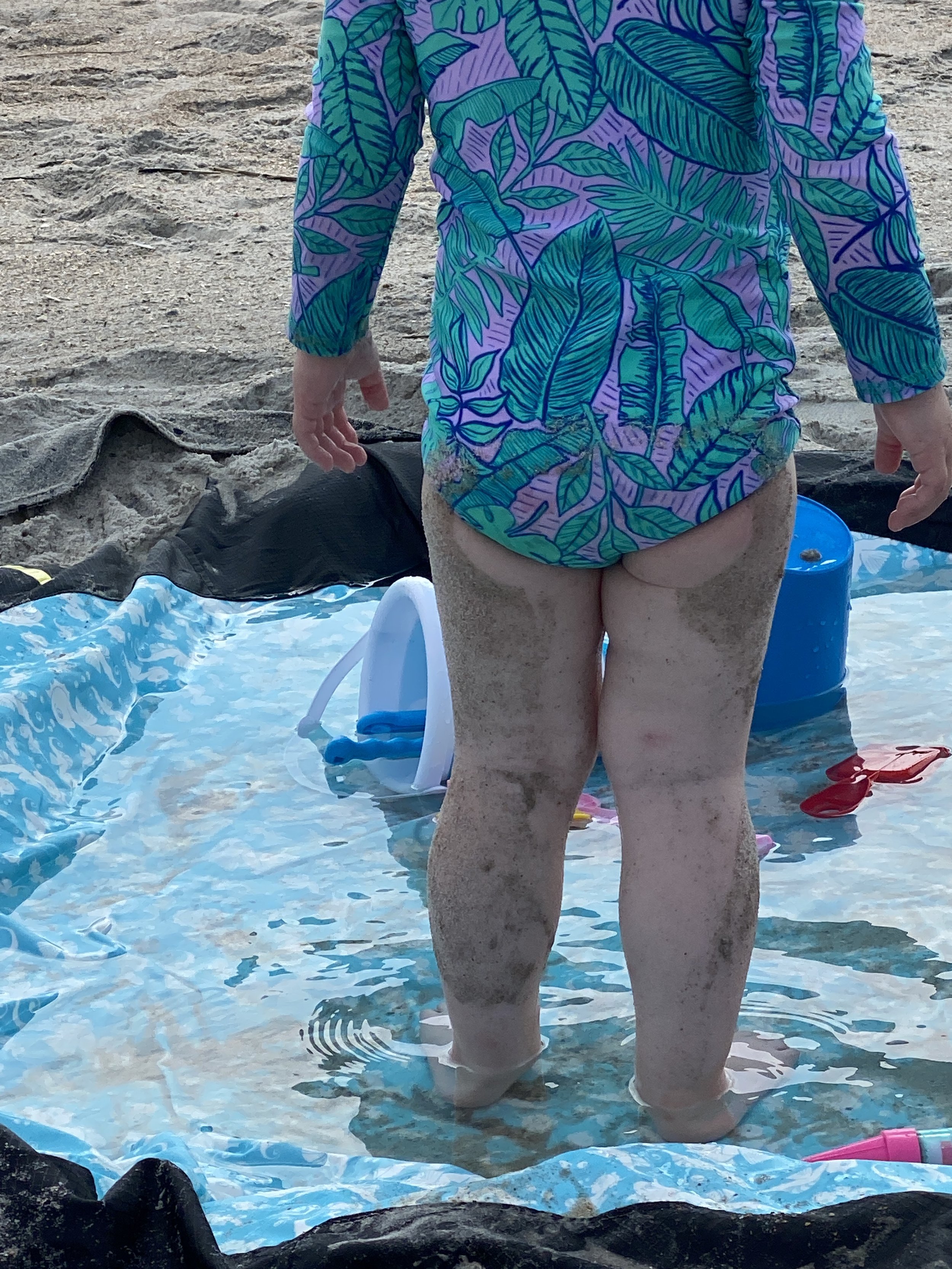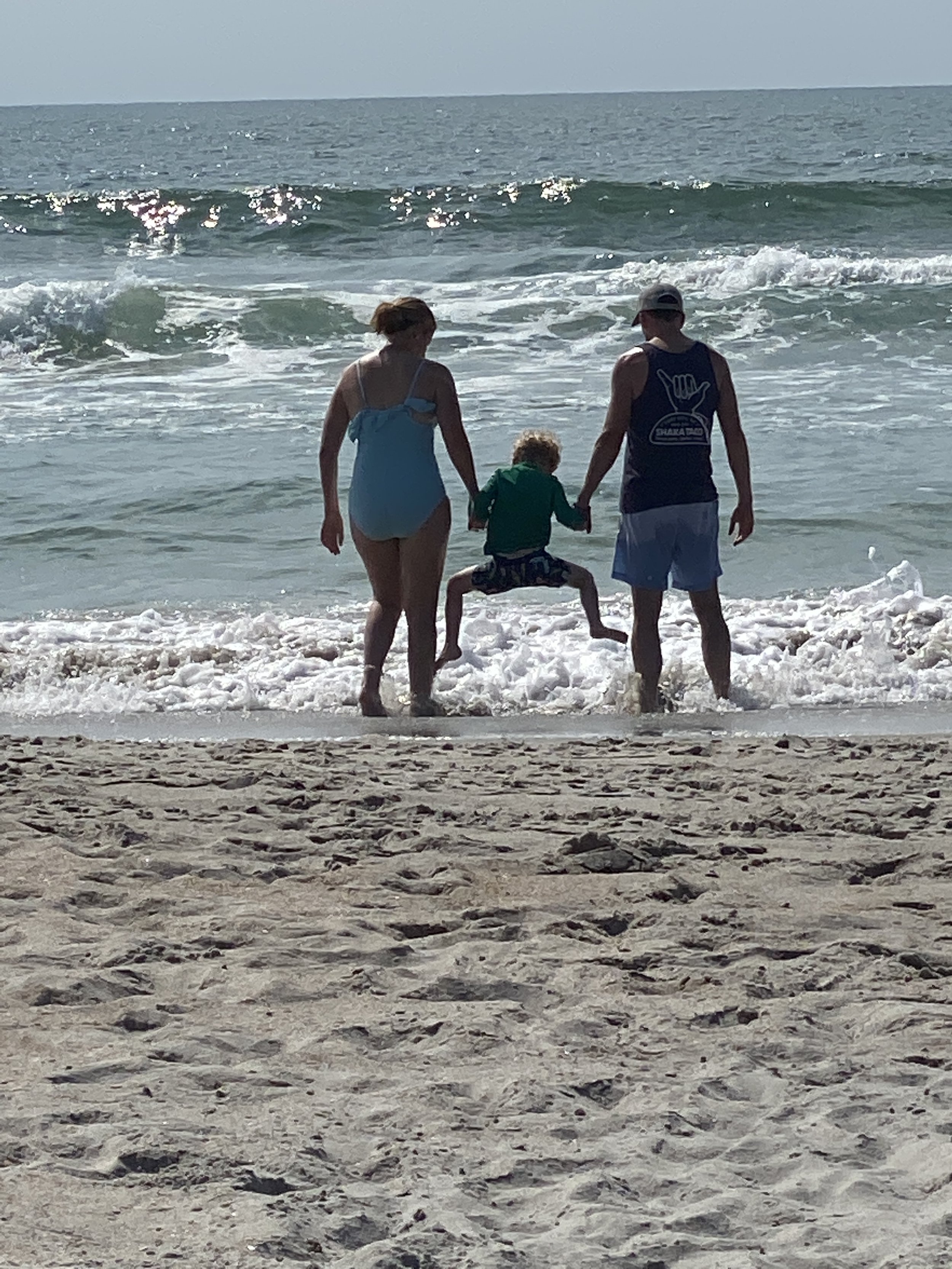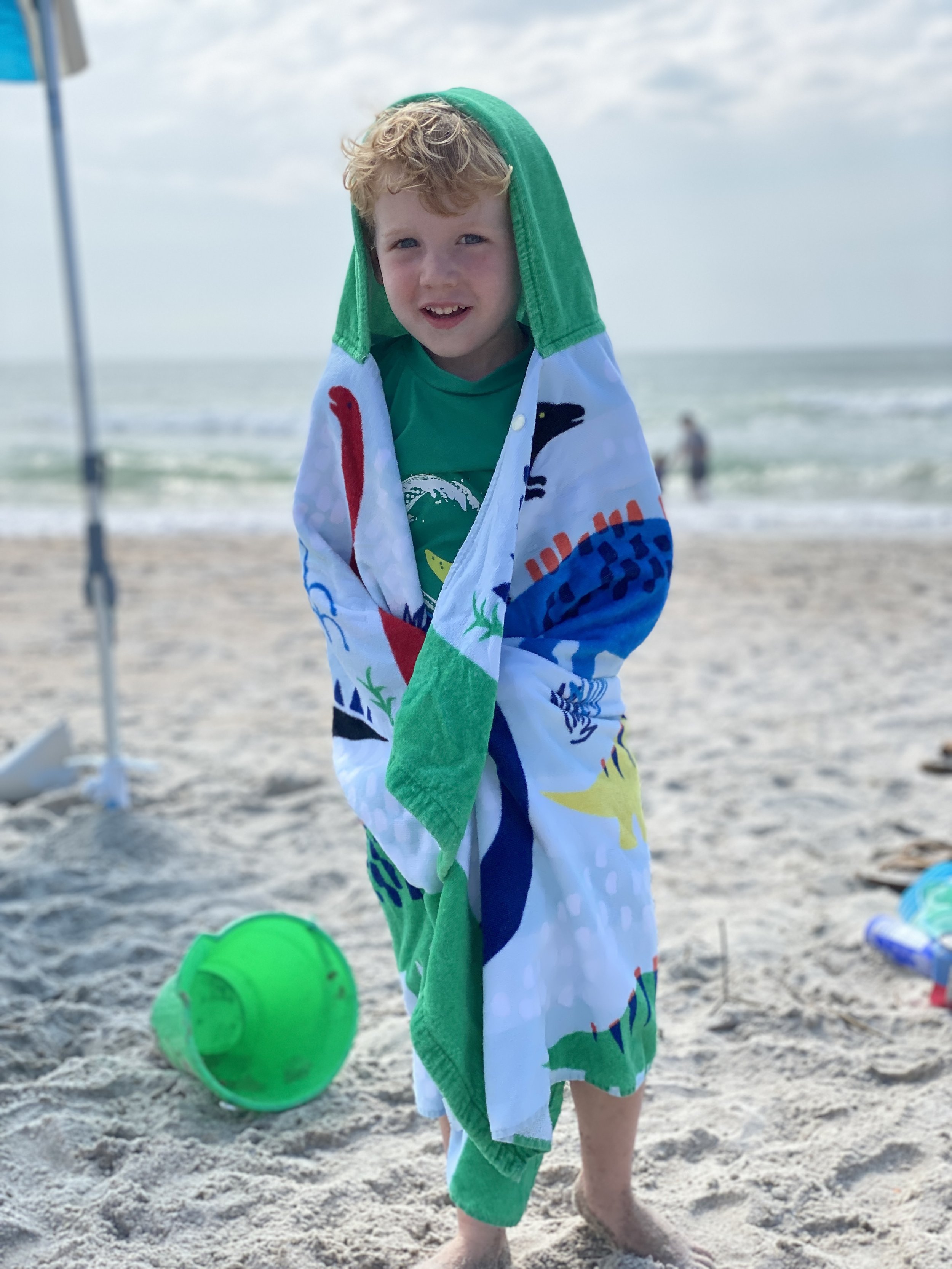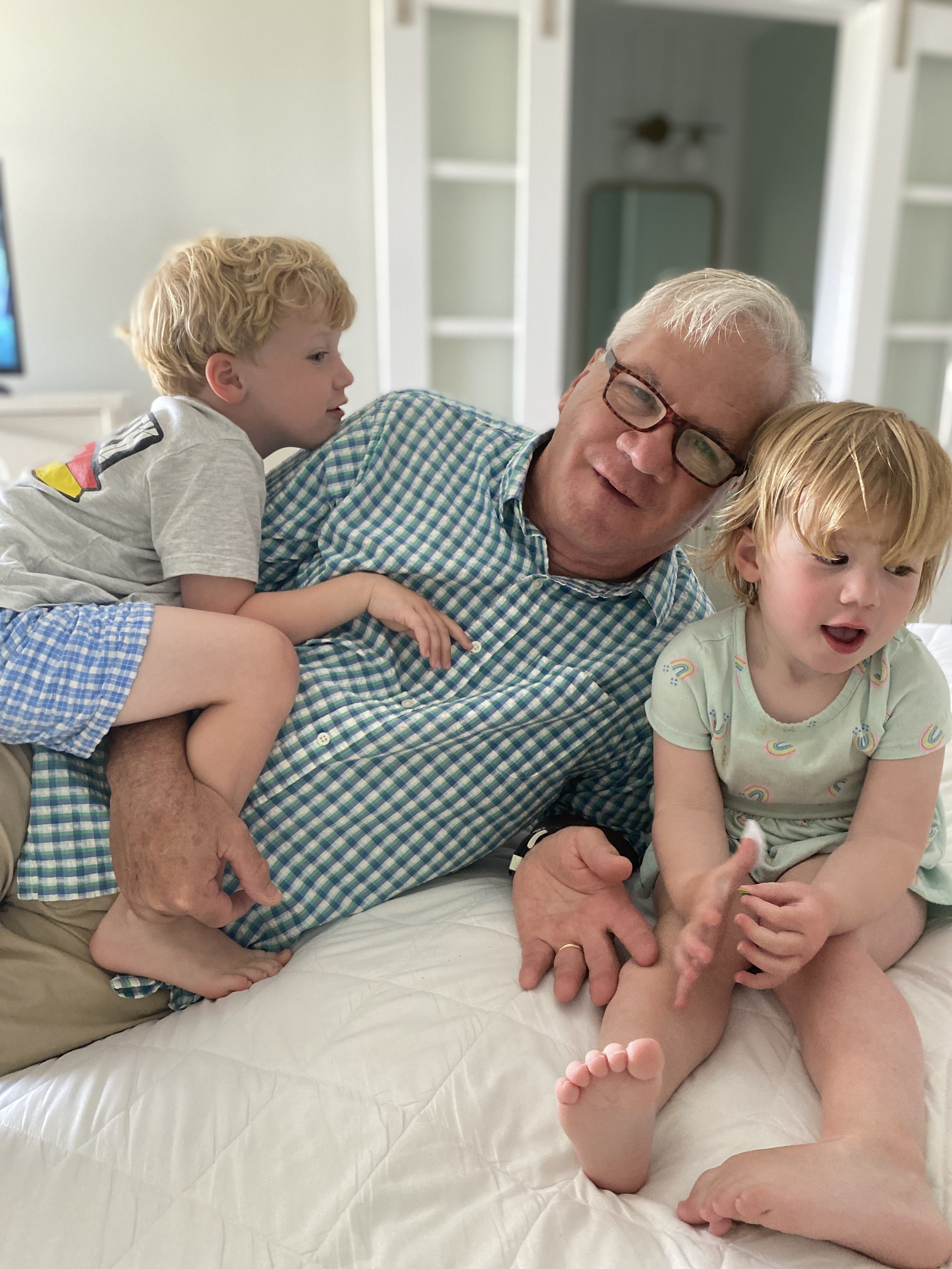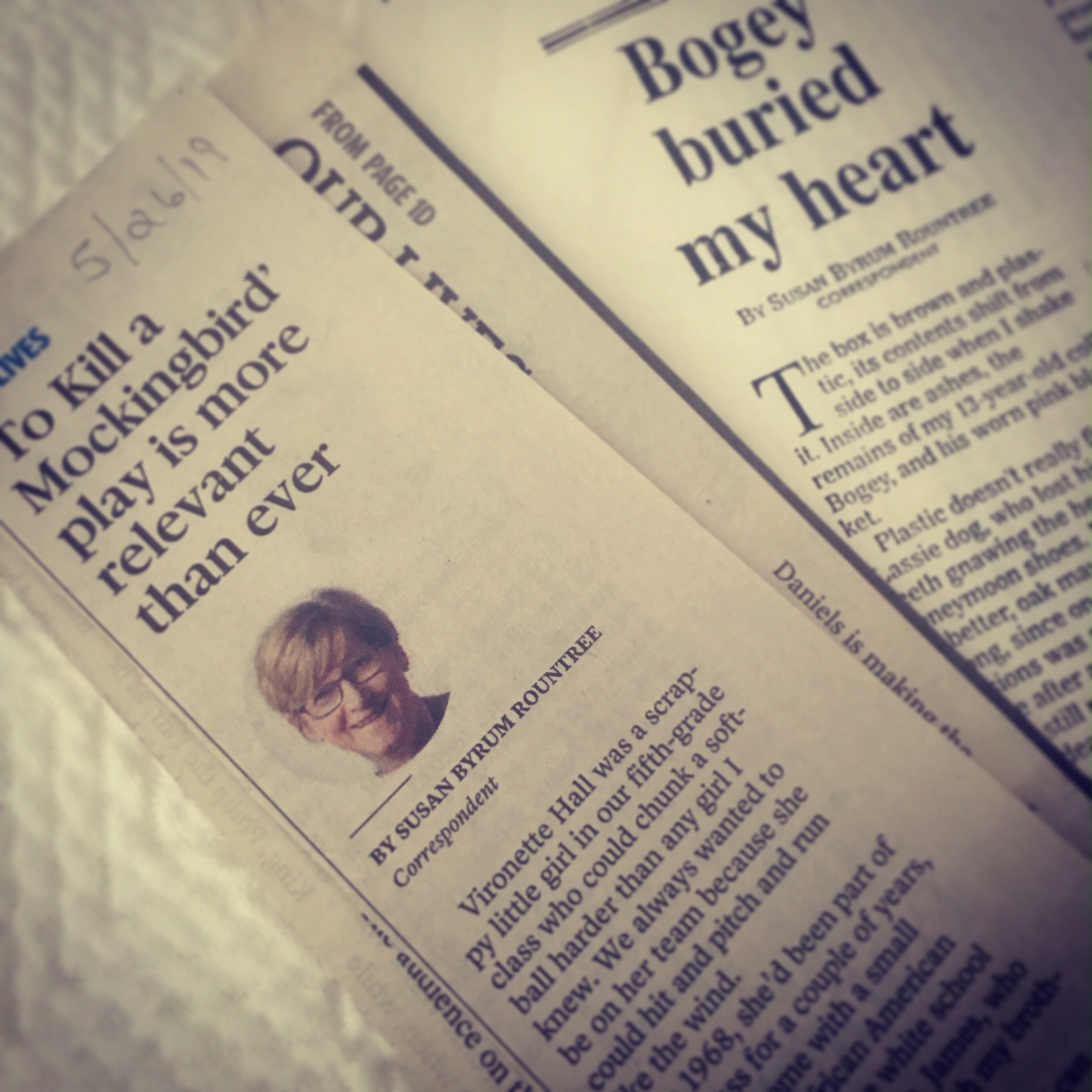One Dog's Life
Rescued on a bright May day by way of Saving Grace Animal Rescue, Scout “rescued” her owners from grieving over their beloved Little Ronald Reagan, who had recently died of kidney cancer. By her third night in her new home, she was sleeping on the bed between her humans, the only dog in their 43-year marriage to wiggle her way under the covers. Within weeks, she had curled herself up on every bed, chair and sofa in the house, her favorite spot being on somebody’s lap already sitting there.
Fiesty, funny, fearless Scout
OBIT
Jean Louise Finch “Scout” Rountree
May ?? 2016-Sept. 8, 2024
Jean Louise Finch “Scout” Rountree, the Rountree’s feisty canine companion of eight years, died on Sept. 8 at the NCSU Veterinary Hospital from complications of an unexplained spinal cord injury. She was eight years and something.
Rescued on a bright May day by way of Saving Grace Animal Rescue, Scout “rescued” her owners from grieving over their beloved Little Ronald Reagan, who had recently died of kidney cancer. By her third night in her new home, she was sleeping on the bed between her humans, the only dog in their 43-year marriage to wiggle her way under the covers. Within weeks, she had curled herself up on every bed, chair and sofa in the house, her favorite spot being on somebody’s lap already sitting there.
Scout, fond of kissing everyone within reach of her tongue, wooed the doctors, nurses and students at the vet school with her frequent tongue action and her stoic demeanor amid what all said must have been great pain. And this formidable furlady knew pain, from her first months, we think, as she was rescued from the back roads of eastern North Carolina, having been on the run from somewhere in the months leading up to her establishment in Vestavia Woods. Feisty by nature (likely from her hardscrabble roots) she was kicked out of one doggie day care for too many infractions. Two years ago, a bigger dog grabbed hold of her neck and shook her like a rag dog, likely because she was talking junk.
A nurturer at heart, whenever we’d give her a rawhide-free dog bone, she’d run into the yard and quickly bury it, only to return to the back door with her nostrils full of dirt and the bone secured in her teeth. We’ve found bones folded up in the remains of her favorite stuffed animals—which she always chewed to shreds— in planted pots on the deck and even tucked into a sleeping bag rolled up and stored in an attic cubby. She loved French fries, the remains of any sandwich and chasing shadows dancing across the pavement. She adored (most) of her friends “on the track” — Cane and Stella and Izzy and Harley and Rocky and her beloved Sook, who greeted her in heaven. And quiet mornings napping in every sunlit space she could find. Summer tomatoes might have been her favorite food, and somehow she knew when Sooze made the first slice on the chopping board, appearing by Sooze’s side without making a sound. (And Sooze would give her the heel, a piece she never shared with anyone until Scout came along.) So of course, we served tomatoes as part of her last meal on this earth.
Named for Sooze’s favorite literary character, she lived up to her namesake in her spunky nature, and in the fact that whenever she walked, she was first and foremost a scout, her ears shifting like a satellite dish in search of a signal, and her nose searching out if her arch rival Lucy was anywhere near her on the track.
But most of all, Scout loved her people, showering them with her kisses, nudging closely to them at any chance, and taking their warm spot under the covers if they got up to go to the bathroom in the middle of the night.
In addition to Rick & Sooze, she’s survived by Grace & Harold, Sookie’s human family, who loved her despite her many shortcomings; her away-from-home family, Ann & John, who adored her from the first moments she boarded with them eight years ago. And the folks at Armadale Farm Kennel Daycare, who quickly taught her that screaming in public places is not allowed. She was predeceased two months ago by her beloved cousin Mudd and three weeks ago by her human grandmother B. We asked her to seek B out upon her arrival in heaven, and we know she is sitting on B’s lap, licking ... forever licking.
We thank the doctors at the NC State Emergency Veterinary Hospital, who came to admire Scout’s stoicism and kisses in her short time with them.
Scout was our fourth dog and our most challenging. But we wouldn’t not have a dog because one day we will lose them. And she taught us overwhelmingly how to love, no matter what.
Summer Sentence: what we didn't do — and what we did
Summer Sentence
What we didn’t do — capture a family photograph.
But we
ate sand out of puddles
found a fish,
cuddled the baby
ate shrimp,
found the sandbar,
jumped the waves
watched the baby
ate snapper and flounder
mahi and more shrimp
played on the playground
kissed our cousins
shared a cold
traced some starfish
stamped some letters
watched Buzz
and Coco
and the Beast,
read stories
about a polar bear’s underwear
worried that Max’s supper
wouldn’t be hot
counted fish in
’the bailey book’
rode a boogie board
ate some tacos
learned where poops
come from
sang ‘Itsy Bitsy Spider’
sat in Pop’s lap
ate Pop’s popsicles
didn’t eat Sooze’s
cooking
wondered why
Max chased the dog
with a spatula
missed some pages
talked a bluestreak
turned the music down
felt the ocean’s breeze
dug our toes in
held hands tight
wiped our noses
(a LOT)
missed home (a little)
touched the
baby’s foot
found some
shark’s teeth
saw the
turtle hospital
sat with Mommy
sat with Daddy
built a
bunkbed fort
said “cheese!”
and ate some
bacon
rode the scooter
and the swing
hugged Aunt Pamula
asked Sooze to
Google
lots of things
ate some cantaloupe
colored pictures
ate Friday pizza
painted shells
cried a little (but not too much)
sucked a thumb
washed our feet
watched the baby sleep
tickled
the grandparents
until
it was time to
wash our feet
for the last time.
What's a Story Worth?
Every Monday morning, before I’ve even donned my walking shoes, I check my email and find a question for me to answer. It’s a gift my son gave me for Christmas, and he week he asked a question through a website called Storyworth that I'm to answer about my childhood and other things.. When I’ve answered all the questions, my children get a keepsake book.
Now I’m guessing, that since I was diagnosed with breast cancer in 2018 and had recently completed more than a year-and-a-half of chemo/radiation/targeted therapy, that he thought I might die with stories in my head that were still left to be told. It was touching beyond measure, as my kids, historically, have rolled their eyes at my stories. I wondered at the time if he really wanted to know these answers, but I took the gift into my heart as it was intended and starting writing.
The answers, I was told, could be short — a paragraph, really — and when I read that, I thought, well, if it’s a story there must be more to it than a single paragraph. (And I thought, too, that the creators of this website didn’t know me at all! But on that first Monday after Christmas, I got my first question and began to ponder. “What is one of your favorite children’s stories.” A lot. Just one story? How could I narrow a childhood of reading into just one story? But as I perused my mind and my library, I kept coming back to the Illustrated Treasure of Children’s Literature.
Here is what I wrote ( it’s not ONE story, but several):
When I was a child and before I was in school, our library at home was quite limited, as was the town library, which was in a room above the Fire Department (if you can imagine that.) I can still remember walking up the creaky stairs to the library room, watching the dust filter through the windows. Out the window to my left was Pop B’s office, and in front, the Post Office. But you didn’t want to be up there when the fire alarm blared! I remember those details but not particular books I checked out. In the school library, I remember a book called “Little White Dove,” which was the imagined story of what had happened to Virginia Dare. Her life fascinated me as a young girl — does still — and I liked the book a lot.
But I suppose some favorites came much earlier, from a book I have on my bookshelf today called “Better Homes & Gardens Story Book.”
I’m sure B must have gotten this as part of her subscription to Better Homes & Gardens magazine. Somehow it ended up as mine, which was rare for this third child! I remember this was my first exposure to Beatrix Potter’s “Tale of Peter Rabbit,” and grumpy old Mr. McGregor. It was filled with poetry, something I loved as a child, and one of my favorites was called The Goops. “The Goops they lick their fingers and the Goops they lick their knives; They spill their broth no the tablecloth. Oh, they lead disgusting lives! The Goops they talk while eating, and loud and fast they chew; And that is why I’m glad that I am not a Goop — are you?
That would make me giggle, because we were all Goops as children of course! I used to read that one to you.
The stories of Uncle Remus drew me, too, but though they are based on old slave tales, they where written by a white man writing in dialect. ( At Carolina I wrote a paper on “Jack Tales,” and interviewed my boyfriend’s maid, who learned the stories about Uncle Remus from her grandmother, who had likely been a slave. I recorded her and I think that recording ended up in the Southern Collection at the Wilson Library at UNC.) The stories carry universal messages, the language is not appropriate for today’s child.
I loved the poems of Robert Louis Stevenson. He wrote one called The Swing, which I loved to do in my grandparents back yard, and The Land of Counterpane, which was about a boy who was stuck in bed because he was sick and learned to create a whole story with the toys he played with on his bedcovers. And my favorite is probably My Shadow, which is can recite by heart. “I have a little shadow that goes in and out with me. And what can be the use of him ( I would say ‘her’) is more than I can see….”
But the question asks for just one story. (You know I don’t follow the rules!)
The one that keeps coming back to me is from another anthology that I read all the time as a child called The Illustrated Treasury of Children’s Literature. Again, we didn’t have a lot of books in the library, but at home we had this book. You may remember it, because I read from it when you were younger, before we started reading books together like Old Yeller and Harry Potter.
It’s a fairy tale from Hans Christian Andersen, who wrote all the great fairy tales, many of which are dark. The Emperor’s New Clothes (so much like today’s Trump), Little Mermaid, Princess & the Pea, The Ugly Duckling. He also wrote The Little Match Girl. It has never been made into a Disney movie for reasons that will become apparent.
It’s the story of a child of poverty who has to sell matches on the street to make any sort of living at all. And on New Year’s Eve, when no one has bought any of her matches, she is cold and hungry and searching for warmth.
As I child, I could not imagine this life, no more than I could imagine being a princess, but this one drew me more for some reason. I did know children who I never thought of as poor, but who wore the same clothes to school every day and never had new shoes. They would grow out of their clothes but never had clothes that fit. I never asked my parents why this was so.
In the Little Match Girl story, cold and hungry, she walks through the streets and watches the windows of the houses she passes. There, she sees people celebrating the New Year with goose, bright fires in fireplaces, family all around. But as she walks, she grows even colder and sits in a corner shielded from the wind and starts striking matches for warmth.And with every match she strikes a new image of warmth embraces her. She imagines sitting in front of a warm stove until the match fades out. She strikes another: a table set with pretty china and her own roast goose; another brings a Christmas tree, filled with candles (no electricity when it was written); and then her grandmother, who was the only person who had ever been kind to her. And in trying to keep that image alive, she strikes all the matches she has in her possession until she had no more.
The story says her grandmother had never looked more beautiful as she lifted the child up and took her through the stars at the end.
I think it was lost on me that she died in the end! But it’s the story of the warmth memories bring that drew me to her, I think.
So it seems an appropriate story to start this thing off.
I guess, through The Little Match Girl, I learned early in my life that stories can be beautiful and sad and uplifting, all at the same time. And that is so true with life, right? You both have been through joy and beauty and great sadness all at once, as have I, many many times. As your mother, I wish I could shield you from the sadness, but my job is not to shield you but to offer comfort, when the challenge comes. I hope I have done that, at least to this point. And not caused you too much pain as you try to sort it all out.
This is an amazing gift. In the writing, I’ve learned a good bit about myself just now. I look forward to the next question. (I didn’t peek, though they said I could.)
Every week since, then (well, ok, I skipped a couple of weeks) I’ve written stories about my grandparents, what my mother was like as a young woman, how I go to school, the friends I’ve had since before kindergarten. Stories about travels I’ve taken, organizations I’ve belonged to — it turns out the Tar Heel Girls State, class of 1974, was a very progressive group — my first job and given awkward advice about relationships. I’ve written about inventions that have most changed my daily life (the smart phone was first, chemotherapy advances, second.), and shared the fact that my preferred way to travel is by country road. And the question of where I went on vacation as a child? My response to my children was: I wrote a book about that! But as it turns out, the book was about how other families spent their vacations, so there is a whole ‘nother story about our own.
I have always felt I knew the worth of a story, and I’ve told many. But it turns out, the worth of stories prompted by my children are turning into the most worthy of all to me. In these months since Christmas, I’ve mined my own history like no time before, sorting through scrapbooks and scripts of plays I was in, Playbills I’ve kept (I had no idea I’d actually seen Michael Crawford live in a production in London in 1975, though I remember the runway in The Rocky Horror Picture Show too vividly.) I’ve read letters and political platforms that supported rape crisis centers and mental health programs in every county, and statewide recycling. —from that Girl’s State trip —when nobody in eastern N.C. had heard a thing about recycling.
As I said in that first entry: Stories can be beautiful and sad and uplifting, sometimes all at once. Stories can be simple and complex at once, too. And funny and heartbreaking. All of that, all at the same time. And that’s remarkable, when you think about it.
Lately, I’ve been listening to a podcast hosted by author Kelly Corrigan, much of it about the power of story: why we tell them and why we need them. In her conversations with authors from around the country, the same theme keeps coming through: Stories show us the truth of our lives in ways living through them doesn’t necessarily reveal. And it’s in the retelling of our own stories that discover things about ourselves that we didn’t really know in the moment.
So get out that and tell your story, folks. Your family will thank you. And it’s so worth it.
Chemo Camp Finale — Letters from Home
Nov. 17, 2020
I have been thinking about y’all a lot lately. Who, you say? Y’all. All y’all, as we love saying in my Neck of the woods. Do you see that stack of cards there? (more than 250 of them) The flowers? The little gifts? These things have filled my soul these past 18 months as I found myself captured in Chemo Camp.
So I have been thinking about all y’all who got me through it. Re-reading your notes and seeing your faces as I did, thinking of the emails, too, and your visits (way back when those where allowed), the food (Lord, have mercy, the FOOD!) the walks and the phone calls and the quiet moments when we sat in silence and you let me cry as I tried to take it all in. Your laughter. Your donations to Susan G. Komen and the Walk for the Cure. Your telling me I looked beautiful without my hair (though we all know I didn’t) — and now when you tell me you like my new “look”. Every single one of these things that you did for me has made my life so rich while I waited for camp to be over.
November 12, 2019
I didn’t save any letter my parents had time to write when I went to camp when I was 9. I wish I had (maybe my mother has saved the no doubt thousands of letters I wrote to her in the three short days I stayed, though if she has, she has not revealed this.) I’m sure if I had save those letters from home they would have been much like yours: We love you, you can do this, think of all the friends you’ll make and how much fun you’ll have (well, maybe not that last idea for chemo camp.)
When I thought I was going home from camp last November and then found out a week later that my mother was not, in fact, coming to pick me up, and that I would be staying for a whole ‘nother YEAR — you stayed right there with me, sending cards, calling, walking, assuring me that I could stay as long as was necessary, and then I could go home. (No more meals, but alas, I had packed on the casserole pounds in the previous year and girded with such sustenance, I soldiered on through more camp activities.)
Like target shooting.
I remember my daughter did this at her week-long camp and could easily hit the mark, so much so that when she CHOSE to become a camp counselor while in college, (she must have gotten that DNA somewhere else) the camp assigned her this post. My daughter and I have never been the kind of twinsy mother/daughter team some people think of. I spent years teaching her how not to be like me, so I consider this choice as making me, finally, a champion.
And then I became the target shooter, with only one goal in mind: Get rid of the damn cancer.
And guess what I did? I GOT RID OF IT, with the guiding lights of my doctors and the nurses at the Rex Cancer Center, who finally LET ME GO HOME last Tuesday. All by myself.
Though my old pal Tim and my nurse Hope (who hugged me, despite all the rules) wished me well, I drove away, with only the shadow of a tear in my eye.
“She’s grown,” I could hear my mother say. “You have handled yourself admirably,” my brother actually texted.
That part, “admirably,” he quoted what my father might have said, if he were to have reluctantly shoved me off to cancer camp. He is right, Daddy would have said that, but I honestly don’t quite understand.
A friend of mine who had cancer just before me has said often “cancer can’t wait.” (It’s a tagline for a local organization raising money to cure every kind of cancer affecting women, not just breast.) And this is so very true. Sorting through all my cards the other day, I found an email I wrote to my Bible study on May 15, 2019, the day I got the news. I was to lead it the next day, and I told them, so niavely, that a cancer diagnosis would not disrupt the dozens of plans I had for my life in the year to come.
How wrong I was. A cancer diagnosis does NOT wait. Within minutes of learning you have it, you turn you life over to those caring for you and though you ask a thousand and more questions, not one of them is “when?” because the answer is always: “right now.”
One of the few things I remember about real camp is the swimming test. Everybody had to take it, no matter what. I remember looking at the murky river water with the tadpoles swimming in it and asking, “when?” and they said pretty much: “Now”. And I had only two choices: dive in and get it over with, or wade in and swim from one point to the next, as best I could. No bravery. Just truth.
The same is true for Chemo Camp.
On the first round, I dove, head first, not knowing much about what it would do to me (though they did tell me as honestly as they could.) The second time, I waded in, testing the waters a bit, though I knew I’d eventually I’d have to make that dive. And I did.
But despite what some have written me, I am no hero.
My doctor is a hero. She has done the hard work of puzzle master, her fine mind taking my own curious circumstances — three kinds of breast cancer — to task, until she found the exact cocktail combination to cure me. Did you get that? CURE ME. Which she did.
My nurses are heroes. They greeted me and all the other cancer patients as if we were the only one in the room, day after day, caring for us when some get our walking papers, and when some don’t ever. They are gracious and loving and champions for all.
And then they let me go. Tuesday a week ago. Just like that.
I was a puddle. Honestly. After a quiet day in the chemo room I was looking for the marching band. A raised pom pom or two. But when that did not arrive, I looked to Hope, who had nursed me on my darkest day, probably, when I was the most homesick I had ever been in my adult world.
“I wish I could hug you,” I told her. “I will never forget your kindness to me.”
“You are gettin’ it!” she said, breaking all the rules of COVID and giving me a hug I had not had from anyone except my husband in too many months. It was tight. And we sobbed. And I felt healed.
Back at home, family had filled my kitchen with pink. Two dozen roses, one dozen from my birth family and mother, and the other from my family by my daughter’s marriage. “Welcome home from camp,” their card said. Tickled me pink.
When you have cancer and get through treatment, you pick your ‘cancervesary’ as a way to remember it. Could be the day you are diagnosed or the day you felt healed or the day, through surgery, when cancer took leave of your body. That day, the day cancer took leave of me, was one year ago today.
So I take today to celebrate. And on this day before Thanksgiving, to be thankful to God for all of you.
I also want to honor all those who have gone before me in this camp. Who carved their initials on the scaffolding and in the bathrooms and on the the sheetrock that holds so many of these camps in place. I don’t know your names, but all ya’ll have come before me and I thank you for your service and your commitment to allowing doctors to study the disease in you, so that I might live. I honor hundreds of thousands of you, some of whom aren’t here any more, but so many of us are here and leaving our cancer days behind because of you.
I will not forget that.
Now back to the pile sitting in the picture at the beginning of this post. Thank you all for your letters and your love and for not letting go of me when I was taking the swim test at camp. I survived because of you, too, and I’m forever grateful that you cheered me on as I made it, finally, to the other side.
Much love,
Sooze
Charmed
Sixty three. That’s how old I am today.
A year ago, I wasn’t sure the shape I’d be in when I got here. I look at a picture of myself holding my newborn granddaughter, Audie, and though I’m not as bald as I would become, I’m getting there. And there is weariness in my eyes. That 62-year-old’s eyes, well, you can barely see them — eyelashes gone, the light of them, even in the presence of dear Audie, shows hardly a twinkle.
Maybe it’s because I’d spent much of that day crying. My sister and sister-in-law had sent me a gift, and when I opened it, I found what feels now like a hundred charms threaded on a silver chain, charms sent to them from friends and family from all points in my life. Well, if you’ve read much that I’ve written, you know that I’m all about charms. I have two full charm bracelets and now the necklace, and when I first pulled it out of the box I was fairly certain my sister was thinking I was dying. And she wanted me to know how much people around me cared about me.
Certainly there were days in those first few months of treatment that I thought I might. And some of the tears easily fell from remembering those dark days. But I laughed, too, through that puddle, knowing maybe even then that this thing would not kill me. At least not yet.
The necklace weighs several heavy ounces. It’s filled with pieces of my life, like charms of buttered toast and an Outlander book, a hot pink dress and a yellow submarine, typewriters and clouds, a crown and a tea cup, a pencil (and its sharpener, dogs and the Empire State Building, sand dollars and a hamburger, an artichoke and a bird, Bible, crown and peony — (just to name a few) and every single one of them comes with a story all its own.
I wore that necklace every single time I had chemo until it was over, except it wasn’t. On those days last summer and fall, I felt as if I was taking with me a full scale of armor to fight this thing — with the help of all those who had charmed me. And in the hours when I sat in the chair, I fingered each gift, remembering the people and the stories.
Two pieces of buttered toast. Malone and I sat at her kitchen table as pre-teens and teens, eating buttered toast after school and talking about boys. (Today Malone is home after almost a week in the hospital fighting COVID-19. She’ll be fine, but her challenge, this time, has been more than a couple of pieces of toast can cure.) Yellow submarine. My brother — Beatlemainiac that he is — sat close to the stage at last year’s Paul McCartney concert in Raleigh on his own birthday.) Clouds. My niece, whose 2-year-old question: Do Clouds Sleep? still has me pondering. Peony: my mother. It’s the only thing she ever gave me that I seem to be able to grow.
The crown looks like the one that sat on Queen Elizabeth’s head during her coronation, the charm’s original owner the mother of my dear ABSU, who bought it when the two of us saw the crown jewels as seniors in high school. The dog from my college suite mate turned neighbor, Grace, as a reminder of all the dogs we’ve walked together and loved in almost 30 years of neighboring. The cardinal: my sister’s reminder that our father is never far away.
I could, as they say, go on.
There would be no writing about it last year. Most days when I looked at the necklace I cried just thinking about all the people represented in it. I cried for the reason behind the necklace and for the fact of it. I cried because the sheer weight of it felt a lot like the weight I was carrying.
I’m embarrassed now to say that when I learned I’d have to continue treatments for another year, I put the necklace away. I can’t say why, really, but anger at the state of things likely had something to do with it.
Today I’m feeling better. I have hair again, though it looks as though it belongs to someone else — the salt and pepper and curls in no way resembling the (mostly) straight blonde sprigs I had last year. And no, my hairdresser wasn’t hiding my gray all this time! (My sister can’t get over the color when we FaceTime. Nobody in our family ever had this color, she says.)
This morning I pulled the necklace out again, fingering the silver jewels for the story each one tells. And I put it on. And took a selfie. Because that’s what you do when you are 63 years old and can’t visit with your mother on your birthday but want to show her how much you’ve changed. (She’s 92 and COVID confined at home, at least away from me right now.)
Anyway, looking at this new woman I saw something I hadn’t seen in so many months — something I thought cancer had taken from me forever.
Light. Sparkle. Twinkle. Blue. And yet, there it is. I hardly recognized myself.
(Well, today, I actually went into a store to pick up my lunch and noticed the mother of one of my son’s high school friends. Masked (she was as well) I spoke to her, but I don’t think she recognized me either!)
Tonight I (tried) to hold Audie, her squirrelly self no longer satisfied to sit in my arms. And it was grand. We are both so big now.
Tomorrow, very early, I’ll be back in the chemo chair for what will begin, once and for ALL, the countdown til I’m finally done — mid-November. Five. Four. Three. Two. One. And done.
I’ll be wearing the necklace again, armed, and charmed, to begin what promises to be my next good year.
A Year of Living Dangerously
One year ago today I found myself in room far across town talking to a doctor about my favorite shoes. They are straw, with florets across the toe in greens and blues and deep peach, and I’ve had them for years. They are perhaps my most uncomfortable shoes, but because I have a narrow foot they were expensive, I wear them anyway, and through the years I have worn them down until they are almost bearable.
The doctor wore a functional pair of clogs with a pretty swirl design as I recall, and as we admired each other’s choices, both of us knew what the real story was and it had nothing to do with shoes. Her work that day was to find out if I had breast cancer.
“If it turns out to be something, I can get you in pretty quickly,” she said… or something of that sort. I am no doctor but was raised by one so I knew that she was telling me without the words that yes, you do have cancer. (She said as much during the ‘official phone call a few days later. ) No, the story was not going to be about anybody’s shoes.
Yesterday I looked around the infusion room at the cancer center where I’ve spent much of the past year and these days everyone, not only the nurses, wear masks. A woman next to me kept asking her nurse how much longer she had to sit there — a long time, it turns out, because she chose a treatment that will let her keep her hair — she wears something akin to an ice helmet that she has to keep on for hours, and I want to say to her, Honey, that is so not worth it. Though I really miss the hair I had before cancer, the trauma is enough without one more hour in the infusion chair. But one thing I have learned in my year of living with cancer treatments is that everyone has to choose their own course.
Colton, one of my favorite nurses, looked like he was genuinely glad to see me when I walked into the room. He was my nurse three weeks ago, too, and in March he and his wife welcomed their new baby. They hope she’ll share the same day care with my sweet Audie if she our grandchild is ever allowed back there. It’s usually for hospital employees, and Audie got a rare spot way back in December, though now it’s open only for the kids of essential workers. So she is home with her parents every day.
But I digress.
I have not written anything in a long time. Not since what I thought would be my last chemo treatment, in November of last year. I should have been long done with the infusion room by now, should have left my nurses — did, in fact — tell them goodbye with great flourish.
Gone just about three weeks before I was back here with a new diagnosis and a new treatment plan — for a cancer they had missed the first time around… it was there all along, but because of the luck of where the biopsy needle landed they missed it, finding it only when I had a lumpectomy Thanksgiving week. The pathologist did post-surgery tests because they knew my oncologist would want to see it. Not everybody gets that, my oncologist told me back on December 6 when I went for what I thought would be my ‘see ya in 6 months’ checkup.
So instead of two kinds of cancer, I had three. The new one, Her2Neu+, requires a full year of treatment with a targeted drug. And though it had responded to the five months of chemo I had, I don’t get credit for that. Everybody keeps keep saying I’m cancer-free, this new round of infusions will take me through December to make sure no rogue cells have escaped to other places in my body. It’s hard for me to believe anything right now.
Another full year.
So here I am.
It took weeks for me to stop crying. I endured six weeks of radiation in the middle of my denial that this was happening — angry and sad, confused and as shocked as my doctor said she was — the giant radiation machine wrapping its in arms around me, beginning its own pillaging of my weary body. At the time, I was one of only five patients with three kinds of breast cancer at once at our cancer center. There have been more since my new diagnosis, because more post-op pathology is being done. I like to think I started a trend.
And then in the middle of it all, early on a Friday morning midway through radiation, my third grandchild made her debut. I woke up to a text from my son-in-law: “Baby is here!” though she wasn’t due for a couple of weeks. By the time I walked into the radiation room for one of their first appointments, I had my plane ticket to meet her. Baby Hazel knew I needed her to arrive on a Friday, and within hours I was holding her in the hospital, wondering if she would be at all like my grandmother, for whom she is named. (So far she smiles a lot more.)
Because radiation is daily, it would be another month before I was able to visit her again. By then, my body was purely beaten and burned — though some had said radiation would be a walk in Central Park on a spring day compared to chemo, I found it the opposite. Dehumanizing, for one thing, as the techs drew with orange and blue Sharpies all over my upper body to guide the machine to the hot spots. Painful for another, as I covered my breast and back with soothing lotions to ease the burns. (Yes, radiation’s rays have to exit somewhere, so the back is literally their back door. Who knew such thing?) Day by day I lay on the table, watching the machine stop over me, the tiny plates behind the machine’s glass window reshaping themselves over and over so at last they formed an image that looked for all the world like a map of the State of North Carolina.
A few days after radiation ended in early February, I caught another flight to New York, armed with a packet full of antibacterial wipes. I boarded the plane and wiped down every surface I could find — did the same thing in the cab — though I would learn later that it takes five full minutes after wiping for surfaces to be clear of germs. Five months of chemo and six weeks under the radiation radar had left me with weeping wounds that would take three months to heal, and feet so wracked with neuropathy that I can hardly feel them. These are just two of the realities of breast cancer’s cure. (My nurse practitioner keeps telling me that if it’s going to happen to someone, it’s going to be me.)
My medicine, I have always said, is my family. Reading stories to my grandson Henry, bouncing Audie on my lap, getting to know Hazel, smelling my daughter’s hair have seemed like the best ways to relieve my cancer funk. So I flew north that day, searching for recovery.
Now that I’ve been sequestered at home (for the second time in the past 12 months) I don’t like to think about how I walked through the Upper West Side of NYC through grocery stores, the pediatrician’s office, or simply down Broadway without a mask. I washed my hands often but not the groceries themselves like I do now. Who knew then that COVID-19 lurked everywhere, even on those cold days in February? And that within six weeks, my daughter and her husband would leave New York for the safety of North Carolina, not knowing when they’ll be able to return to what is now their home.
On treatment days I don my mask and walk up to the Cancer Center doors, where I have to take it off, sanitize my hands and gingerly take a mask they provide from a small brown bag on the table. (no bringing one from home.) They take my temperature and ask me questions about travel, testing, coughing, etc. Only if all my answers are ‘no’ am I allowed in. The waiting room sits mostly empty, as it’s reserved only for patients in active treatment. No family or friends can come with you. I think of the days my sister sat next to me, my husband, my friend, and how some patients brought three or four people to their corner chair in the infusion room. No more.
I will be honest: I don’t want to be here. I wish my plan had been the one I started with last May — chemo, surgery, radiation and done. If that had happened, I would be well on the way to finally feeling like myself again.
They tell me my new chemo regimen is not so hard on my body as before. I can tell it’s not, because I’m not always as tired as I once was. But the reality is that in the past five months, I’ve felt almost normal for exactly one full day, and it was glorious. It was the Saturday after Christmas, and I woke up early and without pain, walked the dog then started cleaning out my refrigerator practically down to its frame — something I hadn’t done, I’m embarrassed to say, in months. Though I did put my feet up for a bit, that night I attended a birthday party for friends, making up my hairless face and lash-less eyes, changing from my pearl earrings to large hand-painted dangles — went out on a date with my husband. And we danced! I so wish that dream had lasted longer.
A few weeks ago, I pulled open the notebook I’ve kept filled with paperwork from my illness. I don’t know what I was looking for — perhaps some evidence that despite it all, I had made it through the worst of it. Buried in the hundreds of pages was a paper filled with sketches of my options from my first visit with the surgeon, way back a year ago. On that day, she suggested that a lumpectomy would likely be all I had to do, but a biopsy would show for sure what I was facing. Within days, my options weren’t really options anymore, but necessary treatments to keep me alive.
I sorted through the pages and felt my throat tighten until I was weeping. How had I done all this — the surgeries, the infusions, the days when I could barely hold my head up, the baldness, the loneliness and abject fear?
What a mystery it all is to me now. God, surely has been central to it.
Today I reached into my chaotic closet (no, I have not used this time of homebounding to straighten my life) and found my shoes. I’ve not worn them in months, but I put them on today, just to see, as my mother has always said about most anything when shopping.
Just to see. But what was I shopping for?
The shoes fit poorly, just like they have always, just like this whole cancer thing has fit on me. Most who look at these shoes will likely see straw, finely woven. Pretty shoes. But what I saw was not a pair of straw shoes with a few rosettes, but starbursts that I had always known were there but had never truly noticed.
As hard as it is, what is ahead of me is not impossible. There are starbursts, yet to see.
Chemo Camp — home at last
Well, my mother wasn’t able to drive the station wagon to pick me up, but there was a moment when an Explorer the same color as my father had did pause for a few seconds today when my friend since 8th grade Anne Boone and I were sharing lunch at Snoopy’s. Hot dogs and fries— we didn’t share the fries but had our own… both of us having earned it in all these weeks of praying and worrying and trusting. Though I felt for sure that Daddy was sharing the dog with me.
Today was the first of a series of small lasts, but this actually was a big one. The LAST CHEMO. I still have treatment to go and have much to say but no energy to say it, just now, so I’ll just post this picture. Thank you to God and to all of of those who went before me to make sure, through research, that I made it to THIS DAY. And thank you to all who have been part of my captivity, cheering me on and sending cards and gifts and praying and making meals and all the things that we all know how to do when someone is in need. All will be well, and soon.
More to come, I hope tomorrow.
Today was the first of a series of small lasts, but this actually was a big one. The LAST CHEMO. I still have treatment to go and have much to say but no energy to say it, just now, so I’ll just post this picture.
Keeper of the Keys
I turn into the parking lot and park my car at the curb.
‘What’s a phone number?” Tim asks. “And a last name?
Tim has been greeting me almost daily for the past few months, taking my keys and parking my car, while I join all the other souls in the waiting room. He wears a black scally cap and a perpetual smile.
I remember the day I met him, way back in May, on my first day as a new cancer patient, unaware that the cancer center offered free valet parking for those of us in their care.
“I’m new,” I remember saying as I stepped out of the car, feeling quite brave as I recall. “I can walk from the parking lot, really.” He took my keys anyway, smiling, happy in this job that keeps him at the front door in 100 degree heat, in tropical storm rains and crisp fall days. A nurse later told me that once I was well into treatment, walking to my car would become a chore.
Well, after 18 weeks of treatment, here we are.
Tim is among a team of people I didn’t know existed before early June but who have become particular players in the middle of my kidnapping. There’s Jean, the receptionist who checks me in at the door and knows my name now. Andra, who must know my birthday by heart — and who places heart and smile stickers on my arm band. Rose Marie, whose name I memorized by thinking of the Dick Van Dyke Show — she’s helped me juggle my schedule so I can have a small semblance of regular life. Marlene, one of the nurses who accesses my port each week (with a truly tender touch), and Colton and Kendra and Ana and Jana, nurses assigned to me who cheered me on when I came back to chemo after a two-week absence. Jamie, my nurse practitioner, high fives me when my counts are good and doesn’t judge while I cry and curse. You’ve read about Hope, before.
I’ve been getting shots three days a week lately in addition to chemo — an unexpected regimen that keeps my bone marrow strong. Which also means I spend more time at the cancer center than I do anywhere else, other than home. Though I have not gotten to know any patients, these people who are in charge of my daily well being have become a little bit like family. They are pumping me with drugs and good will so I’ll outgrow my need for them, we all hope, in a matter of weeks.
After that, I’ll have a whole new team caring for me in the next phase of this ‘ridding your body of cancer’ camp activity. Kind of like going from high ropes to low. Or from target practice to sailing (though I hear it won’t be smooth. Tim will still be there to greet me, but my nurses will have moved on to other patients. I’ll miss them.
When we discovered the cancer, I wondered what to tell my children, though I don’t remember what rehearsed it in my mind. I did tell them through my tears that we would fit this around our already busy summer and not the other way around. But the reality of cancer and its treatment is that in the mind of those treating you, there is no more important life event than your recovery. Not grandbabies being born or 91-year-old mothers who need hip surgery, not sisters who fall and break both feet at once, not husbands who find themselves scattered along the edges, waiting for signals. No grandsons you wish you could hold tight but can only visit by FaceTime. No Friday night suppers with friends. No church. Work, when you can do it, has to be from home. The big C breaks in front of the line on all you thought you had planned.
You must simply pull up to the curb and hand over your keys.
I’m not sure what I expected that first day when I gave my keys to Tim. Like most things, I’ve learned that there is theory and then experience. I would lose my hair, they said. And I did, though in theory I had no idea what it would feel like staring at my bald head every morning. And I didn’t expect when I tried to use mascara on my eye lashes recently and there would be a day when I couldn’t find them. (My eyebrows are gone, too.)
I was so naive as to think I could fit cancer around my life and not the other way around. Missing out on the things that matter to me so much, I know, is a minor inconvenience — momentary realities that when viewed in the long game will seem like a blip. Hair grows back. Eyelashes, too, Google tells me. But the other thing I’m learning about cancer is that it is sometimes hard to see the end of that long game. Just when you look at your calendar and see “last day of chemo!” written (in pencil) and start thinking about who you’ll miss in the windowless room with the warm blankets and the comfortable chairs, the real keepers of the keys (the doctors) throw in another 9—9! — weeks, between chemo and surgery, surgery and radiation, and THE END. Weeks more until they will finally hand the keys back to you and you drive away. You hope forever.
Don’t misunderstand me. I want to be present for the long game, I do. To witness my grandson ride a bicycle and and cut himself shaving, to be present when the new grand baby walks and dances and drives away in her first car. It’s the space in between all that and right now that has gotten to me.
“I don’t remember what I was planning to over summer,” I told Andra, the receptionist, when I checked in for my shot a couple of weeks ago. We laughed, but it was only so I could keep from crying. I really don’t remember what I had planned, though “cancer” didn’t appear once on my calendar, even in pencil.
What had I planned? Was it trips to New York to walk to school and read books and visit the park with my grandson Henry? Or hours of time with two-month old granddaughter Audie and not brisk snatches when I can hold her? I know those would have been on my calendar a lot had there been any room at all.
I don’t mean to seem ungrateful. I know there is no more important work for me now than what I am doing — fighting cancer. Getting well. But I wish they would leave a little room on the cure calendar for LIFE.
A memory: the wee hours of an early spring New York City morning less than two years ago, when I held tiny Henry in my arms and thought: There is no more important work for me to do in this world. I have missed similar moments with Audie, and I grieve that. And so much more.
I keep telling my doctors that sometimes complete healing doesn’t come in a pill or a vial attached to tubes. Life and family and love heal, too. I have those things, surely, but at a distance that doesn’t feel like part of the cure.
My father, a doctor, believed that medicine wasn’t always the answer to what ails you. And though in this instance I know he’d tell me that this is what I have to do right now, he would also say that the distance between my reality and my hope will narrow soon enough. I just have to hang on a bit longer.
One day in the next few months, Tim will hand me back my keys, and I’ll drive off. Seeing him won’t be on the calendar anymore. I hope he won’t take it personally when I don’t look back.
Chemo Camp: Cut, then Come Again
My friends have been filling my house with flowers these past weeks. Bright zinnias and black-eye Susans from their gardens, pink roses and white hydrangeas for the hall table. As they fade I remove the dying and combine the living, creating new arrangements for new places in the house.
I love bringing the outside in on these hot days of late summer, when very little grows in my yard at all. My mother did this all of my childhood, cutting flowers from her garden patch and setting them on the kitchen table, in the family room, beside the bed when we would visit.
At 91, she still keeps a small garden in the back of her patio home filled with plants she moved from home. Large pink peonies grace her kitchen table in the spring, and in summer, shasta daisies crop up on the kitchen counter. She can throw a Gerbera daisy from the grocery store into a corner of the garden and it will bloom all summer.
She tried to give me mint she’d dug up from the back yard at home, but it died in my care. Iris bulbs? The same. But her little corner garden bursts with color, as it has all my life.
I love fresh cut flowers, too, but in recent years I’ve had very little luck in growing them. The peonies that pop in spring in my back yard my mother gave me as bulbs. They took years to bloom yet have somehow survived — and thrived — on my own benign neglect. My husband and I have over the years tried to fill our borders with perennials that require little care, but the voles and rabbits keep feasting on them. So we plant, they feast and we replace.
Just after my diagnosis this spring, I found some zinnia seeds I’d bought, maybe last year? I can’t remember. The kids and I used to plant a cutting garden along the side of the house each spring that actually grew into something, but that project fell by the wayside over the years. Each year I’d buy seeds and daffodil bulbs in bulk but the best I could do, it seems, was to plant a tomato plant or two and fill my porch pots with caladiums.
But I found these seeds. Looking at them and thinking what lay ahead of me, I wanted desperately to put something in the ground that would soon pop up its head and grow into something tall and beautiful. I can’t explain it, really, but despite the fact that it was pretty late in the growing season, I handed it over to my newly-retired and resident gardener, and he didn’t look at me like I was crazy.
Instead, he set to work, scattering the seeds between the tomato plants I’d not quite successfully plugged in the ground and the leaves of my spent peonies.
Over the weeks, he watered and mulched, weeded and trimmed, even going way into the back yard to the abandoned compost pile he’d forgotten years before. I’d come home from work, and he’d be out there shoveling and watering (our water bill was more than $200 last month) working with this tiny plot.
Within a week, he’d coaxed the seeds to bloom, and so, in time, I picked a few and brought them into the house, bringing new life into this place where my own is being zapped out of me, bit by bit.
Then came my birthday, and let me tell you it was a virtual florist in my house. I must have had a half dozen arrangements scattered around the house — from the Farmer’s Market, from gardens around, a couple from the florist and one from the church altar. It was glorious, all the summer color splattered everywhere.
And then I went to the doctor for chemo.
My white count was low, they said, so they gave me a week off. I didn’t want that, mind you. Chemotherapy is not something you look forward to until you can’t have it. One week off is another added on to the end of treatment. So they began to question why. As they looked at my diet and my resting and my working and everything else you have to consider when you are in the middle of treatment, one of the nurses asked, as an aside: Do you have any live plants in the house? Any flowers?
It had been my birthday, I told her. And though I usually don’t get flowers even from the husband on the birthday, yes, I did have, well, a few.
Get them out, she said.
Why? I asked.
The spores, she said. They cause infection, she said. Which can land somebody like me in the hospital, she said. Which would be bad. Very bad.
All that beauty. All the love people had showered me with in bringing life into my house. Just a few flowers, really, but something growing and beautiful and hopeful right at the very moment when I needed it. That hope.
I handed the vases to my husband, one by one, and told him to toss them. And I hated it.
In the early mornings since, I walk outside to my zinnia bed, eyeing it with love and with trepidation. I don’t think I’ll look at fresh cut flowers the same way, ever again.
Zinnias are my favorite summer flower. The hydrangeas have rusted, the bachelor’s buttons have long-since dried up and roses, well, I’ve never been able to grow them. But zinnias? You toss the seeds and almost from nothing they pop their heads up, and the more you cut them, the more they come back.
Each morning my husband tends our small spray of flowers as if it were an acre, snipping and mulching and musing over them like he did the children when they lived under our roof. She’ll be back, I can imagine him telling them, a reminder for himself, too, on those days lately, when neither of us wants to spend time with me.
Yes, I will be back, but it will be awhile yet. Christmas, they tell me now, before all is well and good again. The zinnias — and all my garden flowers — will be long gone.
But here’s the thing about flowers. Some, if left to themselves, will dry and reseed without my having to do anything to help them.
I’m counting on that. For my tiny zinnia garden and for myself. New growth, come spring, for all of us.
The Devil You Know: Chemo Camp, Part 3
The camp counselors in charge of my life right now kept telling me I’d be in for it when the Red Devil made its introduction. I’d read about the drugs they would pump into my body every two weeks, like clockwork, for two months. (The Red Devil is one of two). And even that first time when the nurse brought out the giant vials I thought, well now, they aren’t so red after all. Not blood red anyway, but a brighter pink than I expected.
I don’t know what I was thinking. A lighter pink might mean a softer blow? Yes, I lost my hair, but I kept my pace that first couple of infusions, resting when my body said to, pushing forward when it felt like I could. I sat for those two hours crunching on cherry popsicles (which I hate) and talking to my sister and my friend AB about everything except all that redness flowing into my veins.
I would not be outdone by this. I had bandanas! I had special chemo scarves! I’ve had what has felt like a sky filled with cumulus clouds full of witnesses praying for me! And one of my first “counselors” was Joy!
But it didn’t take long to learn there is not much joy in the actual treatment for breast cancer. There is an overwhelming sense that a stranger has moved into your house, uninvited, and you have no way to evict. You must trust other strangers you’ve only just met to rid your home of this intruder. It may be a complex mission but it’s not complicated, you remind yourself. They do this every day, like the people you hire to do all sorts of things you aren’t personally trained to do yourself. Like roofers and electricians and carpenters and such. And though you might be “one in eight” in the statistics, you are one among dozens they will see in a day’s time who might be getting some version of the cocktail they are giving, to shed you of this unwanted thing.
And though you might be one among almost 270,000 women who will be diagnosed just this year with invasive breast cancer — 15 percent of whom will have the triple negative kind like you — that’s not really a very large number in the scheme of things. But then, you are that one, in eight, that it’s happening to.
So that’s what I scrape the skies about in the middle of the night — at 2 and 3 and 4 am, when I can’t sleep. I lie in the dark, praying — even when I don’t feel like it — for myself and my doctors nurses and all the people I know in this world who are hurting — way too many — and the millions I don’t know but who are as well. Like the young nurse in scrubs in the waiting room at the cancer center last week — younger than my daughter — but already wearing a wig — herself one in eight among her own peer group.
Back in June, they signed me up for four doses of this Red Devil — Adriamycin — which a nurse told me just this week gets that name because it takes you to hell and back before it makes you well. Joy first called it that as she was plying me with popsicles. (Adriamycin can cause mouth sores, so they try to keep your mouth as cold as possible in the 10 minutes or so that it’s actually being pushed into your veins.) It’s so toxic, apparently, that there is a lifetime maximum on the number of doses patients can have.
After the second dose, all that redness started seeping out, my skin erupting in ways I’d not seen since acne days, a painful and unsightly rash that looks like measles, creeping across my back and chest and arms. A constant dry cough took over at night, so neither I nor my husband could sleep. By day, fatigue set in that wasn’t curable by an afternoon nap. (I’m on my third dose of Prednisone for the rash, and the number of pills I take morning and night for various things when I barely took more than vitamins three months ago is embarrassing.)
All this time, I’ve been trying to work, at a slower pace, surely, but work. When it’s all over, I want to add the moniker “cancer survivor” to my list, along with grandmother, writer, yeast roll maker, left-hander and dog nose kisser — way at the end, not the first thing to define me, but one small thing among many that make me into me.
Keeping it to just a small thing has proven harder to do this summer than I thought. Two months in, I’m weary. I long to have a Friday night out with friends or spend a weekend at the beach or visit my mother. But in recent days, I’m pinned to the corner chair in my sunroom trying to concentrate on a book because I have little energy for anything else.
Which is why on Monday of this week, I was back at the cancer center, trying to get someone to hear my weariness, to help me out of it, if that was possible. To find some way to stop the cough and the sore throat and the fatigue so I could actually sleep for several hours in a row.
The young nurse sat across from me, handing me Kleenexes, as I listed my laments. If I could sleep, we agreed, the world would look a little brighter.
“You’ve gotten through the worst part,” she said. The worst? But I have another 12-week stay at chemo camp before my mother can retrieve me. “A lot of people don’t have as much trouble with this next round,” she assured me.
Even though I am indeed a crybaby, I lied, telling her through my tears that I am not really like that. Except it wasn’t a full-one lie, just a tiny one, as I have kept my counsel, proudly so, throughout much of this ordeal.
“It’s ok,” she said. “You have a safe place here.”
In that room with her I did feel safe. I changed the subject from myself to my son and his wife, whose first baby was due that day. I wanted to be well enough, I told her, to meet the newest member of our family without a thought of this damn disease that’s stolen my summer. I want to be there for my grandson, Henry, and for my daughter, who will have her own daughter in January.
“Right now you have to take care of yourself,” she said to me. “But keep your eyes on the goal.”
“They are my goal,” I said back.
Leave it up to me to make a cancer nurse cry.
She has a six-month-old daughter — Grace — my daughter-in-law’s name. During our conversation, she thought about own mother and baby, and for a small moment imagined what it might feel like if her mother had cancer like me.
As we both dried our tears, I searched for her name, but her ID was upside down.
“What’s your name?” I asked.
“Hope” she said. “It’s Hope.”
Of course. Of course.
And so, there was God was again, stepping into my eighth week of chemo, with Joy and Hope, and I learned about Grace. (I promise, I’m not making this up.) Too serendipitous to be coincidental, at least in my thinking.
I’m sleeping well now, and my cough is almost gone and I’m feeling so more like myself than I have in weeks. Next week I’ll start my new camp session — two new drugs that will do other crazy things to my body — but I do so feeling renewed, somewhat, and ready for the onslaught.
And for today. It’s before dawn on August 10, and today is BIG. Sometime today, I hope to finally meet our newest family member, who has taken its own sweet time getting here. We don’t know yet if we’ll be greeting a baby boy or girl — yesterday I bought both blue and pink bows for my son’s mailbox — but it doesn’t matter. Born in the middle of what has felt like a stolen summer, this new baby offers it back. And no devil, red or not, can steal it away again.
Dear Chick
August 1, 2019
Dear Chick:
I remember the day, almost 30 years ago, when I wheeled my grocery cart around Food Lion in search on one last thing to fill my growing boy’s Easter basket. My offering of jelly beans and Peeps seemed rather paltry. I needed something large that would stand out.
And there you were, your black eyes staring at me, yellow arms outstretched, your orange beak almost shouting at me: Take me! Take me!
The boy didn’t yet have a favorite friend, but he had a yellow blanket he loved, and so I thought you’d match each other well. Off we headed to the register, Jelly Beans and your soft yellow torso in tow.
Morning came, and the kids saddled up to the kitchen table to check out their loot. Your boy, who always left his candy in his basket for months until the magic beans melted together, plucked you up like he might a new puppy, and in this mother’s eye, rarely let you go. As he grew, though he didn’t take you to school (he tried), you sat with him on car trips, always, snuggled up with him each night for a story, hid in the caverns of that yellow blanket — it’s folds and you lit by a flashlight — long after you both were supposed to be asleep.
Once, you must have hurt yourself somehow, because you and the boy came downstairs to show me your arms, now guarded by green Ninja Turtle Bandaids, carefully placed. I wish I could remember the conversation, but it’s very possible (and likely) that he had identical ones on his knees.
In time, the boy wore the blanket to shreds, but you could still be seen holding fort beneath the windows left in the yellow threads by his nurturing hands. You were a team, the little yellow Chicky and the boy.
Until one day, while the boy was on a father/son trip with his dad, I found you abandoned on the bed. I couldn’t imagine he would have left you on purpose, but he was now in first or second grade, and maybe boys of that age didn’t want to be seen snuggling up to what others might see as a stuffed toy, in the middle of a cabin filled with boys and dads. That weekend I do remember, because the boy came down with a high fever and had to come home, and when we placed him on the bed, he searched until he found you, carefully tucking you under his arm, a place you had long-since molded to fit. And there you stayed for a really long time.
On another day, we visited the boy’s grandmother, who had a dog fond of chewing things. The boy had left you on his bed while he ate his breakfast, and upon return, found pieces of your face scattered about the room, your beak torn away. I thought he might be inconsolable, but he picked you up and loved you all the same. (A dog lover all his life, he did not, however, ever like that dog again.)
And so the boy grew up and moved away to college. The blanket was long gone, except for a tiny corner of silk and yarn and a single band of silk, salvaged by me because I couldn’t bear to throw it out. But you, you sat on his bed for the long-haul, beak-less but waiting for him whenever he came home. I know his love for you never wavered, though it may have waned in those years. Yet you were patient, somehow knowing that one day you might be needed again.
I thought about that, too, as I moved around his room, cleaning out, changing it from boy’s room to college kid’s and beyond. I sat you on his bookshelf, then on his chest, trying to find the perfect spot for you to stand sentry. I brought you out on his wedding day, wrapping what was left of the ribbon from his blanket around your neck to remind him that he might be grown, he would always be our boy.
This year, spring came, our man was about to become a Dad. I knew he needed something special to show him just how great a dad he would be, so I plucked you up, studying your whole body for the holes that might need stitching, the stuffing that might need replacing, and when I found more wounds than a box full of Ninja Turtle Band-aids could heal, I searched Esty for a shop that might care for you as I would. I found a woman who through her description promised care for you in her healing as much as our whole family did.
So Chicky, I bundled you up with a prayer and a picture of what you looked like at your most loved (but with your beak), and she set to work. You arrived safe at home a few weeks later, carefully wrapped in tissue paper, your new beak smiling as if you were chirping, Thank you! Thank you!
I found a box and put the picture of you and the boy and your Band-aids inside, wrapping you up with a special note. And on Father’s Day, I put you back in the boy’s arms, ready for your new work to begin.
Now you sit in the crib where in just a few short days, a new baby will be joining you. We don’t know if it’s a boy or girl yet, but I’m certain that as he or she grows, they will reach for you and will feel all the love poured into you by that boy rushing out to greet you, dear Chick. You. And you will pour all the love you’ve been holding in your heart right back out, and a new story will begin.
You have an important job, watching out for this new child growing up in our family. It is my hope that one day, the boy will find you under covers lit by a flashlight long after you and your new owner are supposed to be asleep, and he’ll crawl inside with the two of you, to see what the story is all about.
With much love, Sooze
Man on the Moon
I’ve been watching all the news about the moon landing, 50 years ago this week, with as much interest as I did as a child. And I’ve been watching the divisiveness in my own back yard — Eastern North Carolina — my home, a land I love deep in my heart but in too many ways, in too many people these days, I don’t seem to recognize. In 1969, we were divided as a country, too, but today those divisions have deepened beyond what I could have imagined even a few years ago.
The moon landing occurred when I was about to turn 12, and we sat up late, watching the fuzzy screen as man set foot on that orb for the first time. Just the Christmas before, we’d watched as men orbited the moon for the first time. It was a remarkable moment to witness.
I’m reposting this story I wrote at Christmas, to remind everyone that for a few moments in history, we forgot about what divided us and remembered that we are ALL Americans. Watch the coverage of the historic moon landing this weekend. Remember who you were then and how much our nation could accomplish when we served a common purpose.
From the News & Observer, Dec. 20, 2018.
Man around the Moon
When the movie Apollo 13 was released more than 20 years ago, I stood in line for an hour for tickets. I wanted to introduce my children to the heroes of my day — not sports or entertainment personalities — but astronauts, men who used their wits and slide rules to accomplish the unimaginable— reaching the moon.
John Glenn. Alan Shepard. Jim Lovell. Gus Grissom. Buzz Aldrin. Neil Armstrong. We knew these names as well as any politician’s when I was growing up. We followed their careers as if they were rock stars, watching launch after launch, splash down after splash down, mourning when three of them died before ever taking off, cheering with each success. We imagined what the world would look like when viewed from the heavens.
The year I would turn 11, we got our chance to see for ourselves.
It had been a year like none other. Nineteen-sixty-eight. In the course of 12 months, our nation was immersed in turmoil: two assassinations, almost constance racial unrest, violent anti-war protests, and the election of a president who would one day resign from office amid political scandal.
That Christmas would be hard to top the year before, when my father, who’d been in the hospital since just after Halloween, came home on Christmas Eve. Though a friend had told me her truth about Santa, my father’s homecoming was all I’d wished for and proved Santa existed, at least for another year.
But maybe watching the news on Christmas Eve, 1968, when Walter Cronkite reported that Santa had left the North Pole and was traveling south, I was a bit wary of the myth. There was too much anger in the world, too much war and sadness, for someone as kind and giving as Santa Claus to really exist. (Truth, though, is that I’m still waiting for him to show up at my house again.)
We’d been following the Apollo 8 mission during Christmas week and knew it was the most important yet. If successful, the crew would be the first humans to leave the earth’s gravity, fly to the moon and to orbit it. Landing on the moon would be the next goal.
On Christmas Eve, we watched as Frank Borman, James Lovell and James Anders broadcast from space, giving us our first glimpse of what earth looked like from afar. They captured the earth rising in the moon’s sky as they flew from the behind of the moon, Anders taking a photograph that would become one of the most iconic images in history.
James Anders Photo
Everyone alive on that night in 1968 is in the picture. We are there, looking toward the moon and a camera almost 240,000 miles away looks back at us — a swirl of blue and white — and in that moment, there is no turmoil, only beauty.
As they orbited, the astronauts, with earth, the moon’s surface and the darkness of space as their backdrop, recited the first 10 verses of Genesis 1:
“In the beginning God created the heaven and the earth. And the earth was without form, and void; and darkness was upon the face of the deep. And the Spirit of God moved upon the face of the waters. And God said, Let there be light: and there was light. And God saw the light, that it was good: and God divided the light from the darkness.
“And God called the light Day, and the darkness he called Night. And the evening and the morning were the first day. And God said, Let there be a firmament in the midst of the waters, and let it divide the waters from the waters. And God made the firmament, and divided the waters which were under the firmament from the waters which were above the firmament: and it was so.And God called the firmament Heaven. And the evening and the morning were the second day. And God said, Let the waters under the heaven be gathered together unto one place, and let the dry land appear: and it was so. And God called the dry land Earth; and the gathering together of the waters called he Seas: and God saw that it was good.”
The film is scratchy and old, the words garbled, but it is goosebump television, even today.
The next morning, we woke to presents, one of which was my first camera — a Kodak Instamatic with a flash cube on the top. With it, I began looking at the world through a new lens, one no doubt shaped by the events of that pivotal year.
Fifty years later, here we are again. Our culture — and Earth herself — in daily turmoil. This Christmas, as I set about ordinary things — working and worshiping, wrapping and baking —I’m caught by the extraordinary, how a single mission in a turbulent year 50 years ago tomorrow gave us pause to come together for a few startling, historic minutes.
That’s what I’m asking for this year. For a moment, at least, when we are all one.
-30-
Susan Byrum Rountree can be reached at susanbyrumrountree@gmail.com
I feel bad about my hair
“Above all, be the heroine of your life, not the victim.”
― Nora Ephron
My hair and I finally came to an understanding when I was in high school and I got it cut in a short shag. Until my senior year, I’d had years of bad hair days, starting when I was 1 and had not a single hair on my head.
Maybe I was cute when I was four (not a lot of pictures exist, so there is no telling), but when I was five, the daughter of my mother’s hairdresser — in beauty school at the time— practiced her perming skills on me. My otherwise short, tow-headed sleek ‘do’ was now a nest of curls more suitable for a bluebird than me.
When I did choose my own style — despite every reason to the contrary — I chose a long Patty Duke flipped-up style that drew my chin down to my chest and widened the gap in my teeth. This was the same year I got acne and breasts and everything about me seemed to grow so awkwardly that I wanted to keep myself hidden in my room until the ugly duckling gave way to the promised beautiful swan.
Only that part didn’t happen either. Oh I grew out of the Patty Duke and cut my hair shorter and managed to be if not a beautiful swan, then an ok looking duck.
But my hair.
My sister had long locks in high school (she was dubbed the pretty one and I the baby) and I longed for those. But some hair just isn’t gonna go there, and when mine tried, the ends split and dried out and frayed until when I finally got the nerve to ask that same daughter of the hairdresser — who by now was doing my hair regularly — to give me that short shag. My mother said then, and often, “You always look better with your hair on the short side.”
She’s raised me on bobby-pin curls done up Saturday nights for Sunday church, so I knew nothing of curlers. My sister must have had some instruction — maybe from Molly, her friend’s sister who was in beauty school — because she rolled her hair with giant curlers, frosted it just so, and it came out looking beautiful, her hair draping across her shoulders like a soft blanket.
But I always felt bad about my hair.
That shag, though, took me through the 70s until Dorothy Hamill came along and showed us how to think about hair as geometry. Her hair molded to her every move, forming exact angles no matter how many “Hamill camels” she performed. This, somehow, was a language I thought my hair might understand. I wanted my hair to move like that. I still remember the day I sat bravely in a new Raleigh stylist’s chair at Crabtree and asked for it. From that day forward, my hair and I began a new relationship with each other, me and my Hamill cut— though I would later abandon it from time to time, depending on Princess Diana’s chosen style.
Then came the 80s, and talk about geometric hair! I got another perm and my new curls formed the perfect triangle. (Every time I see “Sleepless in Seattle” I’m reminded of this.) But now I had not only my head to care for but my daughter’s, so the hair, eventually, had to go. (Hers was so much prettier and thicker than mine.) So I cut mine short, where it stayed, and for the next 30 years, I felt good and bad about my hair, depending on my stylist.
I found myself been feeling bad again, after staying with the same stylist for too many years, and in the past year I left him. It was truly like a divorce, leaving the man who’d given me massages on my head and neck for at least 10 years, who’d styled my hair for my children’s weddings — letting go of that, and of our friendship, was hard.
But from the first time in her chair, I knew Carla would make me feel better, if not great, about my hair again.
And she did, painting it the color my sister said I was born with. And using her own geometric skills to shape my locks so no matter how many weeks passed, the shape stayed the same and in place. I didn’t feel bad about my hair for the first time in a very long time.
And then, well, chemo happened.
When I entered the Rex Cancer Center doors for my first appointment, a beautiful, tan and bald woman passed by me, her colorful skirts swaying as she walked. Her head, shiny as a bowling ball, glowed as she walked. No way could I sport that look. My head, though fully covered with hair at the time, was covered not in shine beneath my hair, but eczema. Not a good look on its surface, I could well imagine.
We met with our chemo educator a week later, and she looked at my hair and said: “You’ve got a really cute cut.” As in: too bad! And then went on the explain that if I kept my hair, I’d be the first in history. The drugs I’m taking target all the healthy, growing cells in my body as well as the bad, so the healthy, growing hair follicles are the first — at least the most noticeable — to go.
When Carla heard my diagnosis, we both cried. Then she trimmed my hair and said she’d be taking care of me for the next nine months, whether I had hair or not.
A few days after my second treatment, my husband, who had never even met any of the stylists who’ve cared for my hair in almost 38 years of marriage, drove with me to Carla’s, sitting on her bench as she gave me a buzz cut. (She’d cut it in a perky pixie only a week before, to prepare me. At the same time, she styled my wig so well my husband couldn’t tell I was wearing it for 20 minutes.)
Carla took her time, sliding her shears through my head until I said stop. I’d not seen my head so bald in my life, and to say it was hard doesn’t cover it.
A friend who had breast cancer years ago had given me bandanas to hide my head, and I tied one in a cute bow and went to supper with friends. The next day, we packed up for a week at the beach, and all seemed right.
Until the next day, when in the shower, my hair came out in sheets.
Long gone was the short shag and the Hamill and the wedge and all the other “dos” I’d sported in all these years of having “the best hair in the family,” so my mother said. But there it was.
My sister came over, wanting, she said, to see my wig. I warned her about what my balding head would look like as I changed from the bandana to the wig, and she held me and cried with me, hard. It was the first of many kindnesses she’d give me during that time.
I have never had long, luxurious locks, but they were my locks, no matter how often I’d felt bad about them. Ever the crybaby, I deserved a moment or two to grieve them. And my sister made space for that.
I hated for my children to see me this way. I prayed that my 15-month-old grandson Henry would know me by my eyes and not my hair. The next morning, I was up early, as I am every day during this kidnapping, and he greeted me with bright eyes and a smile. And all was right.
I’m getting used to it. My husband says he can see my eyes, brighter than they were before. I honestly don’t know why. Because I am tired, and sometime sad, though showering is quick and getting dressed for the day is far easier than it was a month ago.
As for the Nora Ephron quote at the top of this story: I’m not the victim in my story, nor am I the heroine. (those are my docs, and God) I am, in fact, myself, and I just happened to have been taken aside from my life for a little while while my kidnappers — my care team — whom I am growing to love as hostages do, make me well. The victim, we all hope and pray, is actually the cancer, and that with each sometimes grueling treatment, it is fading, fading so that in a year’s time, it will be the dimmest memory for us all. Most especially for the tips of my hair.
+++
If you are facing a cancer diagnosis that promises hair loss, think about these tips:
Take pictures of your hair as you love it.
Shop for a wig while you still have hair, so those fitting you can see how you wear it.
Wigs can be expensive and are not necessarily covered by insurance. Some cancer centers (like Rex) offer cancer patients a free wig, hat or hair covering. Take advantage of that.
Have your own stylist trim it to suit you(make sure they are trained in cutting wigs, as of course the wig hair will not grow back)
Your scalp will signal you when it’s time. It will become sensitive, even a bit painful, as your hair is about to go.
Allow yourself to grieve. You’ve had your hair a long time.
Don’t shield your family from the reality of what you’ll look like for the next almost year.
Consider your beauty. It’s way more than hair deep.
Stroke, revisitied
Three years ago, while we were on our annual family beach trip, my husband suffered a stroke. He’s fine now, but as a public service on the anniversary week of that pivotal day, I’m reposting.
Here’s the original story, which ran in the News & Observer, in August, 2016.
The young family across the street from us gathered on the tiny front porch, then walked hand-in-hand — all eight of them — across the street to our driveway. My husband, who stood on the deck, walked down the steps to greet them. They were strangers to us, but two days before, the six children and their mother had gathered on the porch, witnesses to our family crisis.
“When you had your heart attack,” the father said, shaking my husband’s hand, “I was at the store. My wife called saying y’all were looking for aspirin, but I couldn’t get here in time, so I told her to take the kids inside and start praying.”
Which they did that morning and every night at supper after that. They didn’t even know my husband’s name.
Truth is that on that Tuesday morning in the middle of our vacation, my husband had a stroke. And a seizure. He is alive and well today to tell the story, though he doesn’t remember it. Doesn’t remember how we found him unresponsive on the deck of our family beach house — lips blue, face ghostly, body rigid — doesn’t remember my screaming, our daughter flagging help in the street, our son-in-law running toward where my sister stood three houses away, yelling for her to call 911.
The children witnessed my extended family running toward us, saw my husband wake up, thank God, flailing his arms at everyone around him, looking to take a punch. Which is so not him. What they didn’t see, thank God, too, were the blacks of his eyes — unseeing as we all gathered around him, tried to calm him, waited on EMTs.
We would spend two days in New Hanover Regional Hospital as doctors tried to figure out what happened. Records show that he presented in the ER with an “altered mental state.” An MRI confirmed the stroke.
That he has no residual effects from any of it is nothing short of a miracle.
In times of crisis, look for the helpers, Mr. Rogers always said, and after the ambulance arrived, I moved away from my husband’s side, knowing I was not one of them. Around me my nephews poured cool water over his body. A doctor who happened to be driving by tried to calm him. A male nurse on vacation rubbed his shoulders. I closed my eyes and breathed deeply. “Care for him,” I prayed, for there was no better thing I could do.
“Your husband exhibited the classic signs of a heat stroke,” says Dr. Robert Park, a partner with Wake Emergency Physicians, PA., a private practice which supplies emergency room staff to all seven Wake Med emergency rooms, in addition to several other hospitals in the area. “When I hear he is agitated, all limbs working well, a change in mental status, that tells me it’s a heat stroke.
Heat stroke. A rare occurrence that can be fatal, but something entirely preventable. The curious thing is that he also had a cerebrovascular accident (CVA), the medical term for stroke. (So heat stroke was actually off the table.)
I sometimes call my husband The Skipper. He’s on his seventh sailboat now, Fortune’s Fool V and most weekends in the past year have found him on the deck of the boat piddling with his love.
On July 8, the heat index reached 104 in New Bern, where our boat is docked. And the Skipper forgot to hydrate well. (Forgot to tell me he was even going to the boat before heading to the beach.) The next day he developed a headache, and on the morning of July 12, he drove to the grocery store and purchased an over-the-counter sinus headache medication called Sine-Off. Within 30 minutes, the house shook like it would during a sonic boom and unbeknownst to us, he was down on the deck, closer to signing off from this life than I can even think about.
He had all the signs of dehydration, says Dr. Park: headache, thirst, elevated body temperature. The headache, though, was his only complaint. As far as we know, he showed no signs of stroke: slurred speech, numbness on one side of the body, drooping face.
There is a grave difference between heat stroke and heat exhaustion, says Dr. Park, and heat stroke is much worse. Every summer, as temperatures hover near 100 degrees, he sees many cases of heat exhaustion but fewer heat strokes.
“Athletes, construction workers, people who spend ours at a time in direct sunlight and don’t drink enough water start cramping up,” he says. “They get dizzy, have a headache, cold sweats, may even pass out. That’s heat exhaustion.”
Heat stroke, he says, involves changes in mental status, and other organs — like kidneys — can be affected. If untreated, it can cause death. It’s rare, Park says, for someone to have a heat stroke and a CVA at the same time.
There are so many miracles in what happened — minutes later, and we’d have been gone from the house and he would have been on his morning walk. Seconds later, he would have fallen down the stairs. And so many lessons. We’ve learned about the app on our phones where we can store our medical history. We’re reminded that we have subscribed to a service that keeps our medical power of attorney and HIPPA permissions at hand for doctors to access easily should either of us be incapacitated. (In the midst of the trauma I had forgotten about the card I keep in my wallet.)
Our children have learned that we are not going to be here forever. A scary but important lesson to learn.
We are still seeking answers, and while we wait for appointments, The Skipper has found a new appreciation for water. And honestly, I have a new appreciation for the Skipper. I’m grateful for the helpers and for children who spend a hot summer morning praying for a man they didn’t know.
+++
In the months after the stroke, my husband went through a series of tests at home that determined he did indeed have a blood clot that broke away and made its way to his brain. Regardless of the cause, which was a minute hole in his heart, strokes and heat strokes are life-threatening conditions, and emergency care should be sought immediately.
Campfires Burning, Part I
Anyone who knows me well at all has heard my camp story. It’s legend in my family, and as we head into our annual beach week, it’s bound to come up. How my parents sent me to a two-week stint at an Episcopal Church camp on the Pamlico River where my sister had gone and loved it. And how I didn’t stay. We sit around the kitchen table and laugh about how the counselors all tried to entertain me with sailing lessons and camp fires and songs and whatnot, but I was having nothing of it. All I wanted was to go home and sit at the feet of my mother.
Since it’s my story to tell, I’ll tell what I remember. And it’s a lot. I was excited about going, spending what felt like weeks packing my steamer trunk with all I needed for that whole two weeks — short sets and new Keds and books and my Bible. Towels and clean white underwear and white socks. Crisp white notepaper and stamps for writing home. Some cash money for something called Canteen. Sheets and a blanket that smelled just like my mother’s linen closet.
When the day came, I was ready, and my mother drove me, with a friend, I think, the two or so hours to the river. The counselors took me to my assigned cabin, and I dragged my trunk up the steps and into a room filled with bunks. First issue: I had the top bunk. Second issue: No private bathroom stalls, but a room filled with showers with flimsy curtains and girls everywhere. It was almost as if I was late getting there. Then we all donned our bathing suits and headed to the river for the swim test. I think I passed, because they let me in the murky water the next day.
I tried not to cry that first night, up in the air as I was with the crickets hiding in the rafters, but it was hard. I was quiet, at least I hoped. The next day, we got to the work of riverside camp life — swimming and learning to sail a Sunfish, meeting each other, taking a group picture by the chapel. I have it somewhere. I felt like I met everybody in camp that day, boys and girls, even enough to pick out which boys I thought were cute! At the time, they say, I had the memory of an elephant, and I recall some of them still. (Yes later, one of my three-day crushes joined my church. I remembered him, but he did NOT remember me. Big surprise!)
It seemed pretty fun, but I was wary, having never spent time away from home except at my grandparents house. Back then, I’d stand in front of my mother’s wedding portrait and wail. But I was about to go into the fourth grade, and I was a big girl.
But at supper after my first full day of camp, they served me milk.
I have hated milk since I was a baby, and my mother used to add chocolate or sugar and vanilla just to get me to drink a whole glass at supper. But I gagged at the thought of drinking a carton of plain milk.
Chocolate please? None here, they said.
What about water?
Nope. Milk it is or nothing.
So I began to cry. And what these kind people had no idea about was that when I started, there was just no way to stop it, as the Broadway song goes. So I cried and cried. And cried some more.
The next day, the camp assigned me my own counselor, a cute young college kid who took me sailing and tried to talk me out of my misery. (Many years later, I would sit in front of his sister at church. All Eastern NC roads lead to other Eastern NC roads, but I digress.)
But even on a bright day with the wind in my face, there was nothing he could do. By afternoon, they let me call my mother, just to speak, but I pleaded for her, screaming, to come and get me.
On the third day she finally relented, and I waited on the steps of my cabin, my trunk packed, until the station wagon pulled up, my sister riding shotgun.
And this is where the legend really begins.
We walked around camp, and I showed her everything I’d done in the past three days. I held on to her, afraid she would sneak away from me, until I heard the words: Ok, go in the cabin and get your trunk.
Joy! Relief! I was going home! Forged by this news and super human strength, I dragged the trunk out onto the sandy soil, only to see my mother’s station wagon driving out of the camp gates in the flurry of dust. I ran behind her, sobbing, stop! STOP!!!! And just before she reached the arched entryway, her brake lights flickered.
I can’t imagine what went through her mind as she set her foot on the brakes, or the conversation in the car, or when she saw me run into the cabin. Or in my sister’s, as she witnessed the three-point turnaround to flee — though I would learn later that she begged to take my place. (Here with me a few days ago, she still can’t believe our mother made the decision to leave me.)
I don’t want to cast my mother as cruel here. She is not, and she was not then. I think she was trying to break me of my dependence on her, trying to make me stronger, as she had tried so many times in my short, almost 10-year-old life.
She drove me home that day saying I’d be grounded for the full two weeks I would have spent at camp, and I was ecstatic! I never returned to camp until I took my own second grader to a camp all the way across the state, and I cried the entire way home.
I’ve thought about my camp story a lot in the past few weeks, as I have begun a new kind of camp, one where there is no going home, no matter how much I wish my mother could rescue me. This time, she leaves me standing in the middle of that swirling cloud of dust and sand and her taillights never flicker.
And I’m the one who turns around and heads into the cabin and opens the trunk to see what she has hidden there for me.
Just after Mother’s Day I was diagnosed with breast cancer. In the weeks since, I’ve heard it called a journey, but it feels more like a kidnapping, so I’ll stick with that as I move through it. A journey to me is something you choose, like a pilgrimage or a river cruise and a trip to the Grand Canyon, something vast and inspiring, and one you hope will change you. Not that this kidnapping won’t change me — it already has — and though it’s come with lots of colorful brochures, it still feels a bit like I’m stuck on the top bunk in a place I really, really don’t want to be.
But in these weeks, I’ve found that my cabin is full of amazing women who didn’t want to be there, either. But they navigated the murky waters from that top bunk where newbies like me land, to the door where they have welcomed me, heavy-laden trunk and all.
So Chemo Camp has begun, and for the next few months I’m stuck here as the Red Devil, as they all it, seeps into my core and does its work, trying to kill what’s in me without actually killing me. So far, my days have been spent meeting some beautiful faces — almost all of them women — in my church, in my neighborhood, on my care team, in the hospital — and this time, my camp days seem almost bearable. I’ll tell you about them in later posts, as I this kidnapping drama continues.
I realize I’m mixing my metaphors here. Camp and kidnapping are not at all the same thing — for most people. But I’m finding out lately that I am not most people, at least in the kind of cancer I have (two kinds — Triple Negative and invasive ductal, in the same breast. UPDATE: 3!) Typical me, that.
But I promise not to be unique in the way I navigate it. When I first began sharing with friends, I wrote that there was no way through it except through it. A few weeks later, a friend sent me a book of daily meditations, and there it was in Psalm 21: “‘Lift up your eyes it the hills’ and go forward. There is no other way.”
I won’t be writing only about my cancer on this new blog. That’s not fun! But I will be sharing the gifts that come an almost daily basis. One friend, diagnosed last year and not yet 40 — just as she was about to give birth to her fourth child — wrote to me that she wished people would treat each other all the time like they do when they hear the word cancer. (She is cancer free after a year, with a beautiful healthy year-old baby boy!)
She is right. It’s been like having a birthday, almost every day for the past two months. Cards come, presents, flowers from gardens, food and visits. I couldn’t have told you the last time a friend stopped by for a real visit, until this happened to me. It’s been wonderful to feel so loved, and it’s humbling. To know that so many are thinking of me and praying for my healing is beyond measure. And I’m learning how to respond when I hear — and I will — that someone else around me has been kidnapped as well.
So I thank my mother, both for taking me home that day, but instilling in me that some things you just have to get through. You have the tools, and you will help others as you use them. She has done a lot of that in her life, and knowing that her youngest child has to go through this might be the hardest for her yet.
But I am not alone. I have my family, my faith and my cabin mates. And I have my trunk. And I know my mother packed it well.
+++
ps: Years after Camp I was on a book tour for Nags Headers, signing books in Elizabeth City, NC, when a woman asked me to sign a book for a child whose last name was Spence. “I knew a Penny Spence from here years ago at camp,” I said. From way down the line I heard a voice: “I’m Penny Spence.” She didn’t remember me, but I did her. I have a picture of her by the door of our cabin.
Susanbyrumrountree.com is the original work of author Susan Byrum Rountree. It is copyright protected and may not be used without permission of the author.
news to me
First column in 1995. Last column in 2019. I’ve written for the N&O off and on for years. Thank you to all who have read my stories and written to me about them.
News To Me
My first memory of a newspaper is that it was green. Not in the sense of being environmentally friendly, but it was actually green newsprint — holding mostly television listings (three channels!) and the comics, I think — inserted in the middle of the drab words my parents preferred. My brother — way older than I am by four years — remembers it quite clearly.
When we’d read the green paper, my father, a bit of a magician, would roll it out on the family room floor, tuck the pieces into each other just so, make a few tears, pull at the top and presto! A tall, skinny green tree! From newspaper!
Irony, that.
I guess the rustle and crack of newsprint first drew me to it. How my father used a well-read paper to save the rug under his shoe shine kit, polishing his wing tips bright enough to see his reflection. Long after the words had been used up the paper became sink protector for scaling fish, box liner for baby Easter bunnies, foundation for science projects.
I didn’t know you could actually read a newspaper — much less write for one — until I started school and discovered the Weekly Reader. Again, the crackle drew me as I searched the pictures and words I could actually sound out.
In those days, the newspaper drop at the highway punctuated my early mornings. My father rose well before light (if he had been asleep at all), bringing in the paper and sitting in his chair by the kitchen door, sorting through the day’s news while my mother fashioned oatmeal in her honeymoon pots. Daddy studied the news, his lanky legs crossed, not talking much. “You ought to read the paper,” I can hear him saying.
There was always something about it in our house. Never the “newspaper,” but “the Paper” as in “Did you see the Paper?” Or “the Paper is all about the Democrats.”
The Paper to me was the comics — Cathy, B.C. and Peanuts. (Later I read Love Is and SHU and tried to understand Doonesbury, began to take in the Wizard of Id as Daddy tried to teach me the art of the pun.)
I worked the jumble, drank in the description of brides wearing their mother’s Alençon lace and honeymooning in the Poconos. I wish I could say I wasn’t so shallow.
I was a headline reader — still am to some extent — until there was a murder in my small town. Suddenly the Paper became an important source of news. I scoured stories of the Pentecostal Holiness preacher’s wife who followed her son on his paper route with her pearl handled handgun, shooting the black man who’d been harassing him for weeks. She was acquitted — the paper covered it back in 1976. My father, who had seen both the victim and the accused in the emergency room earlier that evening, had to take the stand.
A few years later I actually made the pages of the Paper, which has always been the N&O. In 1979 when I was a senior at Carolina, my professor assigned a personality feature about one of my favorite people, and I chose N&O columnist Dennis Rogers, whom I had long admired. (Unbeknownst to me, my professor, Jim Shumaker — the original SHU — had also taught Rogers. I would not make an A on that assignment.)
After our interview, the columnist turned the tables on me and asked me why I wanted to be a journalist. I honestly had no idea. I wanted to write stories, and journalism seemed the way to get an actual (however paltry) paycheck. And I wanted one day to become a columnist like he was.
After graduation I woke in my childhood bedroom to neighbors calling — have you seen the Paper? You should read the Paper! My picture was in there, and Rogers had called me, (me! ) an upstart with ice-water blue eyes. (After our interview he had bought me a beer, too.)
I suppose that day was the beginning. Within a year I would become a journalist and two years later I would marry one. We have built our lives around the paper each morning at the kitchen table, trading stories that capture our interest (murder mysteries are still my guilty pleasure.) We talk obits and politics — I’ve been trying hard not to shout too loudly in the past two years, but it’s hard. In my column in the Paper, I’ve not been allowed to pontificate on politics, so I have looked toward the light in the world instead.
The paper drop still punctuates my mornings, so wedded, I am, still in the world of print journalism, and until someone says we can’t, both my husband and I will be.
It’s crazy to think that I’ve actually became the columnist I dreamed of being, thanks to the News & Observer and the editors I once knew there. I hope Dennis Rogers would be proud of his protégé, even if he didn’t know I was one.
Since the first story I wrote back in 1995 about my long-deceased dog, to the most recent about the play “To Kill a Mockingbird,” my stories, I hope, have touched readers. I’m no magician, but I’ve imagined — and hoped — that my words have been at times magical — wry and wise and lighthearted, and above all, personal. My goal has always been to find the small moments in life that create measurable meaning. I hope you have found that in them
It’s been my particular joy — a gift, truly, that one of my life’s goals at 18 was to write for The Paper — and I’ve done just that. I am humbled by the privilege.
But I won’t be writing for the N&O anymore. My stories, though popular, they say, don’t show it in the digital number that drive so much of newspaper content these days. I may not be in the Paper any more, I’ll still be writing, and I invite you to join the conversation. I’ll keep the Henry stories coming, and as our family grows in just a few weeks, I’ll write about that, too. I will also be sharing news of my recent kidnapping (stay tuned!) along with a few things that may surprise even me.
Thank you for reading, and for writing to me all these years. Thank you, mostly, for sharing your own stories and reminding me how much alike we all really are.
That’s not magical at all, but is the beauty and the truth, that a shared story creates community. Thank you for being a part of mine.
Susan Byrum Rountree can be reached at susanbyrumrountree@gmail.com. She writes at susanbyrumrountree.com
keep the sparkle
i called my mother yesterday. it was her wedding anniversary, the third one since my father died, and i'd forgotten to send her a card or a flower. we get busy in our lives, i know, and as i thought about the note or the flower, i realized that the one thing she wanted i couldn't give her. my voice would have to do.
note: i know, i know... i'm terrible at keeping this thing up. but i finally found a story yesterday when i wasn't event looking. so there.
i called my mother yesterday. it was her wedding anniversary, the third one since my father died, and i'd forgotten to send her a card or a flower. we get busy in our lives, i know, and as i thought about the note or the flower, i realized that the one thing she wanted i couldn't give her. my voice would have to do.
how are you? i asked.
'tired,' she said.
from what?
'i washed the windows today,' she said.
windows?
my mother is 88 years old. she lives in a beautiful home filled with windows that let the sun in, in the morning, where the moon casts a soft glow over the living room rug at night. and she does not like a dingy window — never has.
'
i thought i'd start with the front bedroom window and just go along, one or two at a time, she told me. 'but you know me.'
don't i. i have a lifetime of knowing the woman who would remake my bed if it didn't suit her, whose linen closet i used to stand and admire for its geometric organization, the same woman who scoured the whole house spring and fall so when we came home from school you could
feel
the sparkle.
18 windows, she said. and she just kept going along until she had cleaned practically every window in the house, almost by accident. (her sunroom is literally filled with windows. to be fair, one window is safely out of reach.)
18.
on a recent visit to her house i scanned her fridge for the latest comic, since there has been one there since my childhood. tacked close to one featuring a character not being able to hear was an article suggesting that a clean house for the elderly has a direct correlation to their mental and physical stability. as if she needed proof that all her years of home keeping was finally worth the work.

she used to say she never needed to exercise because she vacuumed every day and that was plenty. and it was.
my mother's house is ever ready for company: flowers on the kitchen table, beds made up with soft sheets, pillows piled high and towels hung, waiting. even my son says it's the most comfortable house he's ever slept in. i don't know about you, but i will hope my imagined grandchildren will feel the same about mine.
do you know what day it is? i asked her before hanging up.
'yes,' she said. 'keeping the windows kept my mind busy.'
busy with memory, surely, of the years she and my father sparkled— and there were almost 61 of those.
my mother no doubt slept hard last night, as we like to say where i come from, climbing between her own soft sheets, knowing her hands had touched every pane in that house and left it gleaming.
a lot has happened since my father has been gone. grandchildren married. great-grandchildren born and too many hoped for lost. we could have used his wisdom in the time since, which at times seem like years and others like just days. i'm sure it feels like that in every loss.
but my mother, as always, provides perspective. there still is a bit of sparkle left, even in my father's absence. for one full day she polished her windows to a spit shine, no doubt remembering as she washed each pane, the life she spent with my father, remembering their sparkle in the sheen.
writemuch.blogspot is the original work of author susan byrum rountree. all written work and photography is copyright protected and can only be used with written permission of the author.
Perfect Pitch
I don't usually post these, but I realize not everybody reads the News & Observer, where my columns appear once a month on Sundays. So here it is. It appears in the Feb. 21 edition of the Arts & Living section.
Perfect Pitch
Though I began my career slugging out words in a newsroom, for more than 20 years I worked from home. I loved the freelance life, leaving the office long enough to search for a story or meet with writing students, but I also loved that by the end of the day I was home and ready to collect whatever jewels my children chose to share when they came home from school.
Then college happened, and my husband looked at me and said: It’s time you got out of the house.
Just about that time, my church called a new priest, a man so young I could have been his babysitter. (After hours, he plays bass in an indie rock band.) He set to work, and his youth brought a new energy to our congregation, and soon he began to build a team to help him lead our parish through what would be a time of tremendous growth.
Some of these wonderful folks already worked there. Others, like me, he found within the pews. When he approached me about joining the staff for communications, I was reticent. I cherished my freelance work (and my flexibility). I liked attending church and volunteering, and though I loved the people, working where I worship? I wasn’t so sure.
Then he took me to lunch and talked about that “call” thing, and well, that got me.
In those first weeks I sat in a tiny office filled with somebody else's filing cabinets, trying to invent a job no one had had before me. But soon I was sharing space with my friend Lee, who had a similar lunch and was now leading our newcomer program. Then came Charlotte for endowment and Abby for youth — the Episcopal logo tattooed on her wrist long before she ever thought about working for a church.
Today we are a baker’s dozen — working in music and finance, youth and children’s ministry, administration, preaching and teaching, forging deep friendships as we go, doing what I now know is God’s work.
I think too often when people hear the word “ministry,” at least in the Episcopal Church, they think of hands folded, voices low, lots of fancy language and all that kneeling.
There is that, of course, but there is so much more.
Our weekly staff meetings begin with prayer, surely, and with sharing plans of how our work will help bring our people closer to God. But sometimes our spiritual conversations morph into how popular culture competes with Church, and to mask our frustration, my boss might ask us about our favorite characters in stories as diverse as “House of Cards” and “Star Wars” to “Mary Tyler Moore.”
The Mary Tyler Moore thing grew from a discussion about the preaching rotation (or ROTA), which morphed into “Rhoda,” and of course for most of us, there is only one Rhoda. The entire staff broke out with the theme song, and as it ended, our newest priest, with us only a few months, tossed his collar into the air like Mary did her hat. (No irreverence intended, of course.)
Who does this at work?
Everybody, I wish.
We often leave our meetings laughing, ready to take on the sadness our parishioners sometimes share with us. We’re here for specific jobs — taking care of the building, planning the Sunday anthem, counting pledges — but we listen, too, as we make copies, share lunch and conversation, hearing our people out, even when they think we are not doing our jobs.
A few weeks ago, the collar-tossing priest answered a new call, and we’re heartbroken. He pulled our circle in even tighter, and we will never forget his ministry to and with us.
When we heard he was leaving, the boss opened our staff meeting by saying a friend had asked him what it was like to work with us.
“You know the last episode of Mary Tyler Moore, when they all gather for that group hug? That’s what it’s like,” he said. Later Charlotte posted that image on our Facebook page, and we all wept a little.
Yes, at my office, love is all around, and on most days we try not to waste it, knowing this perfect pitch may be tossed our way again.
++++
Susan Byrum Rountree is director of communications for St. Michael's Episcopal Church.
writemuch.blogspot is the original work of author susan byrum rountree. all written work and photography is copyright protected and can only be used with written permission of the author. She can be reached at susanbyrumrountree.com
the kind and unexpected thing

it's the day after Valentine's Day. my husband and i have been bonding for the past five days but not as valentines. on thursday he had shoulder surgery... not the awful kind that takes weeks to recover from, but traumatic enough that he has been unable to drive or lift or pick up things or put his own clothes on at first.
in all these years of marriage, he's only been really ill two or three times, so he is not used to me taking care of him. i'm not used to it, either, but it's just part of what we do for each other, part of the bargain we made almost 35 years ago, though he at times in the past few days has seemed surprised when i have willingly cut up his meat if needed or helped him slip on his socks.
i remember years ago when he contracted pneumonia and could hardly get out of bed, i brought up some canned chicken and rice soup one day for lunch, and he was overwhelmed at what felt to him like enormous generosity. and that was years before i began making soup from scratch! had i been that unkind to him that it was a new experience when i was not?
the day after the surgery he told a friend i was a saint. drugs talking, surely, and a couple of days later i'd lost my sainthood, as was expected.
i've been thinking about this a lot today, about how people care for those they love in all sorts of circumstances. three years ago it was my mother's turn, when after almost 63 years of marriage, my father contracted pneumonia himself and spent the better part of three months in the hospital. Eighty-four at the time, my mother drove to see him 45 miles (one way) almost every day, and as each day passed, she grew to be more beautiful. i know he saw it, too.
(my husband can't say that about me, because i didn't even shower today til close to suppertime — well, to be fair, neither did he.)
my mother never balked at caring for my dad, giving up her days (but not her hair appointment) to make sure he was getting good care.(maybe it was because of all the times he cared for her through broken hips and other bones, though i doubt that played a role.) he barely talked, yet he knew she was there and doing more than he ever expected of her, to the point that she ended up in the hospital herself. it never crossed her mind that she might ought to stay at home.
i suppose on ordinary days, i have stopped going out of my way to do kind and unexpected things for my husband, though somehow i expect him to do unexpected things for me. i know there have been too many days when i stand at the stove cooking supper that i think: maybe this will be the day that he does so and so for me, when in fact, his just walking in the door and kissing me hello should really be miracle enough. kind and unexpected enough. but i have not been appreciative, i know.
maybe that's why he has been so surprised at my attempt at care, that finally, in his hour of need, i have done that kind and unexpected thing. i am embarrassed, if this is the truth. i thought i had been more attentive to him all these years.
why is that, when you're married so long that you forget that the small, personal gesture is truly important? in the beginning of a marriage, it's all we can do not to do kind and unexpected things, to work at what we hope will be a lifelong love. But it's the lifelong part of it that when you're young, you don't quite understand. at least i didn't. it includes days when you don't like each other, and when you have to do small but important things for someone when you'd rather not.
love creates such tangled hearts.
in these few days when my husband has been a bit immobile, we did get out for a short trip to a dessert store so we could test a few cake samples for the rehearsal dinner
(i)
we
are planning for our son. my husband is the dessert fan in our family, so i made him go.
on the way home, knowing we might be stuck with ice or snow, we stopped off at the grocery store so i could grab some orange juice.
i go to the grocery store pretty much every day, which is neither efficient nor particularly enjoyable, but it's i what do. i made him stay in the car because he is rarely patient enough to follow me through the aisle searching for things i don't need.
on the way out, i recognized an elderly couple i've seen before. the wife shuffles, often unaware it appears of her surroundings, yet her husband takes her down each aisle as if she will be the one to choose Folgers over 8'oclock, decaf or regular.
on this day, they had not made it inside as I came out with my orange juice (and oranges and green onions). his back was facing the store, and he was pulling her along.
in an instant, another shopper and i saw her ill-fitting jeans fall to the ground, bearing her tiny wrinkled bottom to the world. we stopped, trying to help her husband pull her pants up, but it was a struggle. the young woman shrugged, assuming i had the situation at hand, though the truth was far from that.
as a diversion, i'm sure, i found myself thinking of my grandmother — though this couple was about the same age as my mother — and made an attempt to save her dignity.
she wore no belt, and her frail body would not, without one, keep the pants up. so her husband and i held her jeans as we moved her gingerly into the store, seating her on one of the motorized carts they keep for handicapped shoppers. naively, i thought she might stay.
'i didn't know she wasn't wearing a belt,' her husband said. 'she has Alzheimers,' looking at me as if i didn't know.
though i offered to shop for him while he waited, all he wanted was a rope to tie the loops of her jeans together so he could pull her along while he did the shopping. a clerk found one, and together we threaded the rope through the loops, she batting at my hands as i tied the loop into a knot so he could get on with his shopping.
'she's doing pretty good,' he said, introducing himself as Ralph.
'and how are
you
doing?' i asked, almost in tears.
'the best i can,' he said.
'family nearby?'
'yes, but always gone.'
always gone. like me? i hadn't seen my own mother in about six weeks.
i imagined this man at 58, my age, and how their love story had evolved into this — her sitting in the handicapped cart with mittens on the wrong fingers, her jeans stained with her own excrement, unwilling to accept help from anyone but her Ralph.
but he insisted i not stay. so i didn't.
at home, my husband and i made a pact that we would never allow ourselves to be this way with each other. maybe they could not afford help he said, which made me want to search for every Ralph in my extended neighborhood until i found them, so i could give them enough money to change things for them. but how?
later, when i couldn't sleep, i imagined what other kind and unexpected thing Ralph might be doing for his wife in the middle of that sad night. and i could feel how alone he must be, no matter how he loves her.
it's likely that this small woman did a lot of kind and unexpected things for Ralph as he made his career. she raised their children, and when they were the age of my husband and me, maybe he had some kind of surgery, and she took care of him, made him soup and helped him put on his clothes, and he is doing the same thing, in kind, and in love, still, and even though, he really, really, needs someone to help him.
+++
my husband is much better, though an ice storm has kept us homebound for five days, and so today we escaped to our corners and set to work.
later i made supper. he cleaned up. now he sweeps the kitchen floor, which for years has been his favorite thing to do when the evening ends.
expected. yes. but a kind thing that does not go unnoticed on this night.
writemuch.blogspot is the original work of author susan byrum rountree. all written work and photography is copyright protected and can only be used with written permission of the author.
this christmas

this would be
the
Christmas
that our children
gave us our past
in DVD without
our even asking.
we sat,
watching our
younger selves
at just the ages
the kids are now
maveling at
how young we looked
and how rested,
at a time when
we were not.
i had triangular hair
and
I thought myself
beautiful
though now
it's questionable.
at least i was thin.
it is also
the Christmas
that the soul of
our
family
didn't make it.
and that happens
when december
feels more like j
uly,
when weather
and flight schedules
rule
our plans.
our Christmas morning
was not
nearly as punny,
with him not here,
we just did not feel
complete.
it was the
Christmas
that i was reminded
that my father
once jumped rope
to please (maybe impress)
his grandchildren,
and it was a joy
to rewitness
his
conversations
with me
from so many
years ago.
it was a Christmas,
when my boy brought
his bride-to-be
home
and he gave me
the gift o
f time
with him,
which is so rare.
and it was the one
when my mother
told the story of
how she met
my father, and
of the dress she wore
on their first date,
and my daughter found
the dress
in her closet and
brought it
down for
show and tell.
it was also
the Christmas
when i was
so busy cooking
i forgot to
take a picture
of my kids.
so.
it is like
every Christmas:
some sadness.
some joy.
some Christmas.
yes.
and writemuch.blogspot is the original work of author susan byrum rountree. all written work and photography is copyright protected and can only be used with written permission of the author.


